#the fact that he is a honest official with strong convictions who wants to do the right thing
Explore tagged Tumblr posts
Text
With a better writing team and less stupid cartoon antics, The Double really could have been the next Minglan
#the double#it’s got big screwed up families!#family politics!#court intrigue!#reveangeance plots!#but it insists on wasting our time with silly dramatics and refusing to give the families the development they need#why was Minglan so good? because it really made you feel like you were a part of the Sheng family#we saw their good and bad sides and the society that made them this way#the double has the framework for this!#make us see the different sides of the Jiang family!#make us care about them! or hate them in a realistic way!#I am really enjoying the show so far though even when it tries my patience#I want to see the revenge!#also I love Shen Yurong as an antagonist!#even though he is he one who betrayed our heroine so thoroughly and deserves whatever’s coming to him and then some#the fact that he is a honest official with strong convictions who wants to do the right thing#makes him really fun!#best character for me so far!
2 notes
·
View notes
Note
I really felt annoyed on that kallen and lelouch scene where kallen landed on top of him in a sense where both has something to go back after the battle i mean lelouch was asking her to go back with him, I just felt where would c.c. be after the battle, will she be forgotten after it? Will it be like okay c.c. your job here is done you may go and we will go back to our own ordinary lives, will lelouch just let her go if she decided to go....lol and the list go on, (this is me speaking beyond shipping and as a c.c. enthusiast) and if i didn't know that the director is pushing c.c. and lelouch to each other i will forever hate the series cuz c.c. deserves the best (i mean its very obvious with the official arts and scenes and i remember reading something about it before) (can we also assume that c.c. got jealous on that part too lol what would happen if c.c. didn't speak about tabasco will they kiss? lol) I also really have a love hate feeling w/ kallen, she is really a good pilot and i kinda ship him sometimes with suzaku, sometimes not because i love him with euphie, but really that tension whenever they are together fighting or not Idk if its their strong and badass character but they really look good and compatible with each other but then I really love her with Gino the most lol i mean if i find kallen and suzaku compatible then i find kallen and gino most compatible hahaha Its just that kallen can show that she can be weak/soft can be tired or can breakdown (and not the always strong her) with gino. (I hope you can understand this part) I love it when gino picked her up after her battle with suzaku. How I wished gino appeared more in the series, was introduce early and they had scenes more together. I sometimes dislike her cuz she is over reacting in a lot of times like she is just too much and almost in par with nina's reaction most of the times haha (i kinda dislike/hate kxl scenes in a sense too that its one sided like its mostly k and l shows no interest but sometimes it look like there is a mutual feeling between both of them(i mostly felt its one sided shen watching the movie especially the resurrection) (What can you say about their scenes?, when he put jacket to her while she was wearing bunny girl costume, the refrain scene, when she fell on top of him, when she was captured, their kiss? etc.) BUT if you look at c.c. and lelouch relationship and scenes together its just too consistent lol i just love it how lelouch always assured and pursued her from that rooftop scene after battling with Mao, if she is a witch then he'll became a warlock, when he discovered and promised her about fulfilling her true wish, when she asked him if he hated her for giving him the power of geass and about to do something if kallen did not interrupt and bonus: that resurrection scene when he decided to become L.L. (I LOVE WRITING THIS PART OF ASSURANCE AND PURSUING ABT CLUCLU, MY FAVORITE XD, pls add some if i forgot something) i also kinda agreed to that statement except c.c. part lol going around that Shirley -> Lelouch Lamperouge, Kallen -> Zero and C.C. -> Lelouch Vi Britania but doesn't C.C. knows all lelouch's persona and had been supportive and stayed with him from the very start and in whatever path he chose? 😂 I hate it that people come at c.c.'s age and that she witness lelouch grow up like, is her immortality her fault? Like people are okay for male characters of 123456790 age falling for main girls in dramas or some animes for example but not okay if its c.c. lol SORRY THIS POST IS SO LONG it was supposed to be focus only on the first part about THAT scene 🙏
Whoa~ You’re not lying, this is one hell of an ask 🤣😂😅 I read 4 topics in this xD:
Lelouch, Kallen, C.C. scene
Kallen ships (Suzaku or Gino)
Kallen x Lelouch vs C.C. x Lelouch
C.C. & Lelouch's Age-gap
Let’s go in!
Lelouch, Kallen, & C.C. Scene
(can we also assume that c.c. got jealous on that part too lol what would happen if c.c. didn't speak about tabasco will they kiss? lol)
Maybe, but who knows, to be honest. xD The whole interaction was very impulsive, considering the fact that Lelouch was still fresh off of bouncing back from his depression, which Kallen had witnessed and was at the brunt end of.
When Kallen fell on top of Lelouch, I do believe both of them were thinking about that one moment where Lelouch tried to use Kallen to forget his current circumstances. Perhaps part of Kallen wanted it, but knew it wasn’t right. So I adore her for bitch-slapping him. xD The idiot deserved it.
C.C. was just there... I’m not sure if she was jealous or not. Maybe she didn’t give a fuck xD Before I could form my own conclusions, the entire scene is interrupted again because Zero gets called out into the control room.
Kallen Ships (Suzaku vs Gino)
I agree with most of your points in this part.
Personally, in my own fics, I ship Kallen with Gino a lot because for me, Suzaku belongs with Euphemia by default.
But, I do see the chemistry and the sexual tension that could go between Suzaku and Kallen. Like maybe their fights are really just unresolved sexual tension 😂🤣
I imagine a romance between them would be very explosive, passionate, and rough. I don’t just mean this in terms of sex, I imagine their entire dynamic would swing this way too. They’re really opinionated, and they both literally fight for what they believe in, and their conviction is strong enough to rival each other’s.
Suzaku and Kallen just clash magnificently. On the other hand, Gino’s and Kallen’s personalities probably combine. They have things in common, but not too much to the point of being passionate and aggressive at the same time.
KaLulu vs CLuCLu
What can you say about their scenes?, when he put jacket to her while she was wearing bunny girl costume, the refrain scene, when she fell on top of him, when she was captured, their kiss? etc.
In that scene where he put his jacket on her, I think that’s gentlemanly of Lelouch. It’s something I expect from him considering he was born a prince, and also, he has a little sister. On a sidenote, I adore both him and Suzaku for being respectful towards the women in their circle, for the most part.
That refrain scene was a moment of grief for Lelouch and he was being erratic. I said it once or twice, I’ll say it again. I am so happy Kallen bitch-slapped him. It shows that she’s not willing to put up with bullshit, and believes that Lelouch is definitely better than that. Kudos to her, she may have slapped him to his senses. For Kallen, it was a moment of, “Please be who we need you to be.”
It was a brilliant turning point for Lelouch as well. After Nunnally was given the role of Viceroy, Lelouch, at least, realized that his war and his rebellion against Britannia wasn’t just for his sister anymore. It was for everyone he cared about too. It was for the people who counted on Zero’s idea of freedom and perhaps peace.
In summary, I made my stance clear on KaLulu on a separate post long ago. But the gist was, they may have felt romantic feelings for each other, but it was probably brief and suppressed in favor of their grander goals and all that shit that was already going down. Romance just wasn’t appropriate for Lelouch or any of the characters who had something at stake in the war.
In the end, Kallen chose Japan, and Lelouch chose Zero Requiem. That is that. 😊
BUT if you look at c.c. and lelouch relationship and scenes together its just too consistent
Lelouch & C.C.’s relationship is a slow-burn from the get-go. It’s part of the reason why it’s so appealing to me.
Let’s be honest, Lelouch doesn’t even view C.C. as human until halfway to R1, and C.C. took almost all of 2 seasons to acknowledge the fact that she cared about Lelouch.
i also kinda agreed to that statement except c.c. part lol going around that Shirley -> Lelouch Lamperouge, Kallen -> Zero and C.C. -> Lelouch Vi Britania
I understand why a lot of people like this argument. I, for one, believe there’s a grain of truth in it.
BUT in my own honest opinion, I think that is a little unfair to Kallen and Shirley. I’m sure Lelouch cared about the two of them in unique ways and perhaps chose to hide behind masks around them to protect them and to preserve his own façade. Hell, he lied to his own sister for most of the entire show because he thought it would protect her and would shield her from the horrors of the world. (It didn’t turn out well, did it? 🤣) Still, my point is, Shirley and Kallen would have been willing to understand and know Lelouch’s every mask. Lelouch himself, just didn’t let them. And it was for their own good, I believe.
So why C.C.?
If there’s anyone in the world who can understand people’s multiple points of view, it would probably be C.C... She lived through most of mankind’s history, and she’s been alive long enough to take multiple perspectives in, meet different types of people, and see lots of ridiculous shit xD Lelouch slowly becomes aware of this fact as the series progresses, and we do see him have deep conversations with her from time to time. She’s capable of being objective. She knocks some sense into him a lot, especially during the beginning. One notable example of this that I will never forget is the episode after Lelouch realized Shirley’s father died because of his actions. It showed how immature Lelouch was being and how idealistic -- thinking war only took out the bad guys in his side of the story. Point is, she knows when to chastise him and when to offer her consolation, which is part of the reason why Lelouch would pick her as accomplice anyway.
but doesn't C.C. knows all lelouch's persona and had been supportive and stayed with him from the very start and in whatever path he chose?\
C.C. does know him. But I wouldn’t go so far as to say ‘supportive’, nonetheless wholly supportive.
C.C. had her self-serving reasons, just like Lelouch. C.C. was looking forward to the moment Lelouch could acquire enough power and take her Code from her, so she could die. That’s why she saved his ass a lot in R1 and perhaps at the very beginning of R2. Her wishes and her intentions morph very slowly, and at one point, perhaps even blended together -- half still wanted to die, the other half was slowly empathizing and caring for Lelouch.
But yes, none can deny that she stayed with him from start to finish.
C.C. could have left after Charles & Marianne died, and I don’t think Lelouch would have blamed her if she did -- considering it was obvious that he couldn’t fulfill his end of the contract anymore. But she stayed. She stayed and helped, and kept her promise to stay with him to the very end.
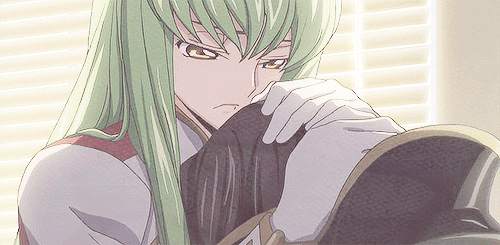
Lelouch & C.C.’s Age Gap
I hate it that people come at c.c.'s age and that she witness lelouch grow up like, is her immortality her fault? Like people are okay for male characters of 123456790 age falling for main girls in dramas or some animes for example but not okay if its c.c. lol
Lelouch & C.C.’s bizarre age-gap is literally not any different from an age-old vampire or any other immortal falling in-love with a human.
I can certainly point out plenty of stories that half this same massive age-gap, and its fans still love it.
13 notes
·
View notes
Text
The Tale of Two Rulers.

...
*Sonia stands in front of the large poster of Roland Sigmund and Oliver Nevermind, standing in front of the large poster.

Sonia? What are you doing here?

I thought I’d just come back to this place...now that the truth of Roland Sigmund’s line has come out, I’m having some internal processing...

Mikihiko Koyasunaga lied about being his descendant, but I am curious as to whether or not he lied about the conflict between my Grandfather and King Sigmund...This poster seems to suggest they were allies...

But, I do not understand...Which of them was king? And why would my family specifically be the one’s to rule!?
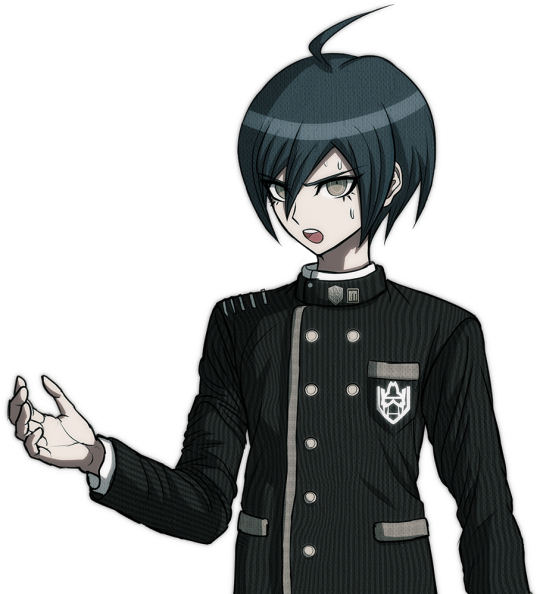
I believe I can answer your questions, your highness.

Shuichi...

Oh, that is right...You made a brief trip to the library that allowed you to find out the truth about King Sigmund.

That’s right...but to be honest, I only told you a small piece of the information I found out. Roland Sigmund was in fact a real person, but he was never Oliver Nevermind’s enemy...

But...I’d advise you brace yourself...This may hit a little hard...

...

Ok...What did you find?
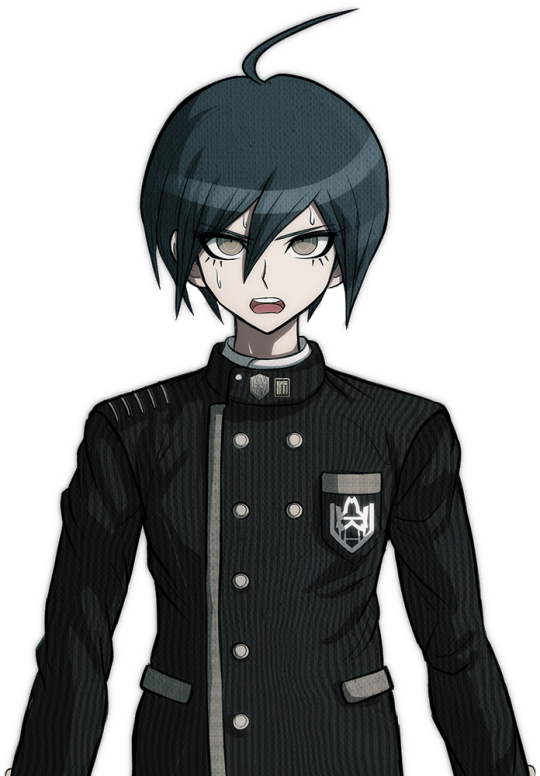
I’ll get straight to the point. Neither Roland Sigmund, nor Oliver Nevermind were the true king of Novoselic...And they weren’t cross kingdom allies either...
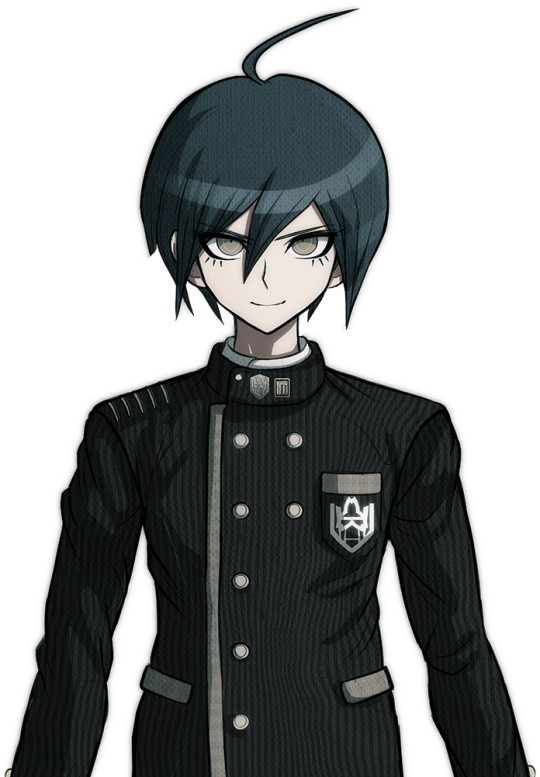
Roland and Oliver...ruled Novoselic together. They were both the king.

What!?
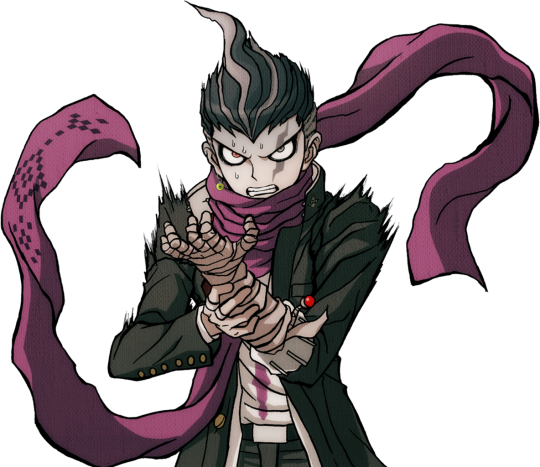
How is that even possible!?

The records were hard to find, but in truth, King Roland and King Oliver had a great secret that their family had kept hidden for many years.

And what was that?

It doesn’t end with just them being friends...In truth...they were brothers.

Brothers!? You mean...Roland Sigmund was also my ancestor!?
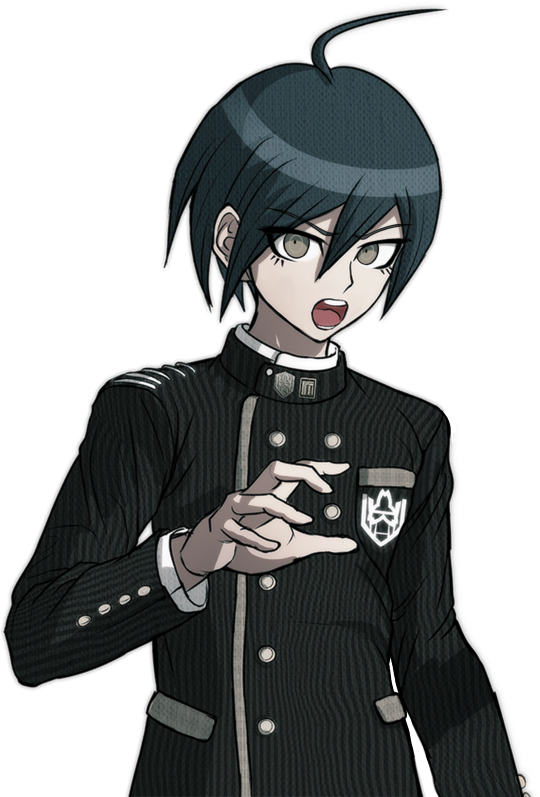
They weren’t just brothers either...Look at this portrait.
*Sonia, Gundham and Shuichi all look up at the poster, at the sturdy figures of Oliver and Roland.

I don’t know if you’ve noticed this, but while it’s clear that they are different people, see how similar the two of them look?

Yes...it is almost like they are-
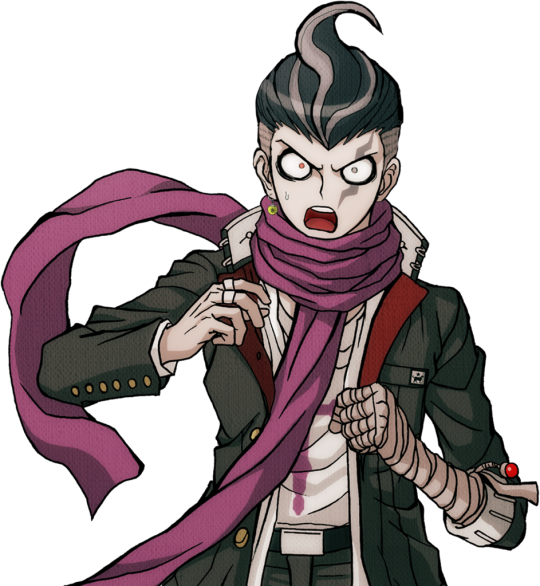
!!!??

Surely you do not mean-!?

They were identical twins. Down to every last freckle.

The full story is this. Roland and Oliver were both born at the same time, and founded Novoselic together. However, Novoselic could only really have one king that the people would answer to. The brothers did not want to compete for the throne, and they wanted to rule hand in hand...so they came up with a plan...One that had more than one benefit.

One of the two brothers, being King Roland, changed his name from Roland Nevermind to Roland Sigmund. From then on, he and his brother came up with an ingenious scheme.

Due to how people could never tell the difference between the two twin brothers, no one noticed which of them was actually sitting on the throne. Every once in a while, King Roland and King Oliver would usually swap places, while one ruled and the other went out to enjoy themselves and spend their time however they wished, without the stress of kingly duties weighing them down. For King Oliver, it was mostly to spend time with his wife and children.

In the end, Oliver Nevermind was believed to be the one true king. Like I said earlier, you are King Oliver’s descendant, Sonia, because King Roland, your other grandfather, never married and never bore a child...

I...I never knew...

Of course you didn’t. It was their greatest secret, one they kept from even the members of their family...But they had such a strong blood connection, they were able to keep it hidden for many years.

Shuichi...Truly, my choice to invite you on this journey was a blessing in disguise.

You deserved to face none of what transpired here...Yet your presence was much needed to bring an end to it.

You don’t have to thank me. And I can’t exactly take credit for finding this out when Mikihiko clearly knew already...
He...
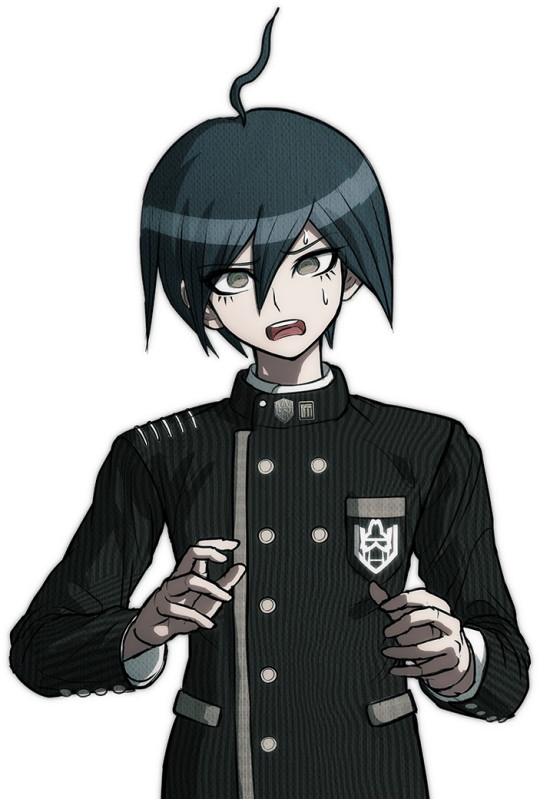
Hm?

Everything...was a lie...He really used...me?

Angie...?

I...I believed in him...!

Novoselic...both your Novoselic and my ideal Novoselic...were almost doomed...doomed because of my blindness...

It is clear now...I was never fit to rule...I was never strong enough...!

Yonaga...

...Take my life, Queen Nevermind...it is your right...I will not be able to rest peacefully until you do...

No, Angie. I refuse...Enough needless blood has already been spilled...

Novoselic is not doomed. It will rise again, and it will do so because we will work together to rebuild it.

...Wait...whatever do you mean?

Ever since I was officially crowned, I have thought long and hard about it...and have come to a few decisions. This being one of the more important. However, I suppose I should start from the beginning.

Even after all that has transpired between us, I no longer hold you responsible for any of that...It is clear to me that Mikihiko Koyasunaga was my true enemy this entire time, and used you as a way to shift the blame of his atrocious crimes. In short, you are as much his victim as everyone else in this kingdom, and I shall let the people know that, I assure you.

As a Remnant of Despair, it was never surprising to me that there would be a number of people, no matter how big or small, whom would heavily object to me becoming the queen...The rift between those who care for me and those who hate me can not be closed so easily...

But...close it shall. One day, I hope to make up everything that I have done to my people, so that we may stand together hand in hand, as one, beautiful nation, that we can all call our own.

And you, Angie Yonaga, will help me bring this about.

B-But your majesty...! Why would you...!? Why would you trust someone who has failed you so utterly! At who’s hand you almost...a-a-almost...!

I have my reasons, I assure you. Truth be told, the duel I invited you to was not done to stall for time. It was a test of character, a test of strength, and a test of will.

From clashing swords with you, I learnt a lot about you. You see far. As far as I can, maybe even further. You are a maker of plans. A doer of deeds. A promising ruler.

Yet, there still remains a lingering shadow of doubt within your soul. Doubt of others born from the doubt of yourself. A true ruler must learn to trust their own judgement...

As of such, I have decided...I shall help you out. I am going to employ you as my kingdom’s regent. You shall fill the gap that was left by Rufus Nevermind’s death.

A regent...!? You mean...you still think me worthy...!?

Who better to help me rule over the realm I love, than someone with as much conviction, strength, and drive as myself?

She is serious about this...She truly wants you to help her save this realm.

Even after all that happened...I think that’s a good idea...

But...I...I-I...

WAAAAAAAAAAAAAAAAHHAAHAAAAA!!!
*Angie falls to her knees and for the first time ever, erupts into tears and starts crying.
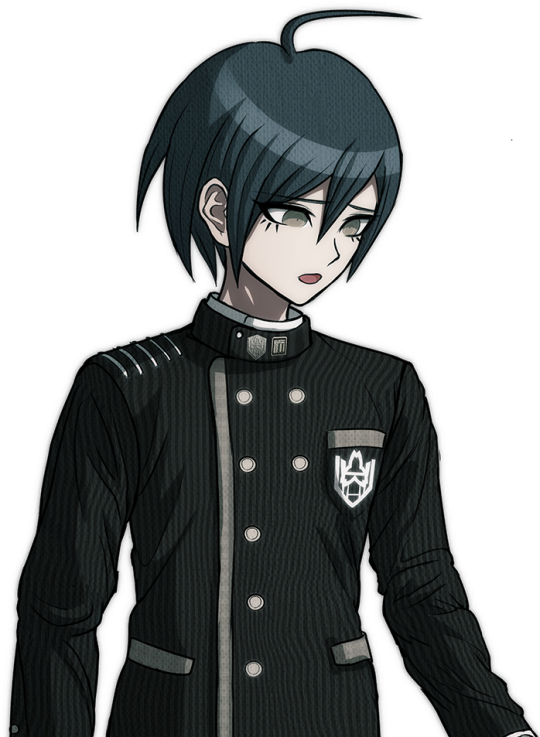
...
*Shuichi instinctively kneels down and gives her a hug. After a few minutes, Angie calms down and gets back up.

*sniff* If...If it please you...I shall accept and shoulder whatever responsibilities may come with the title...I will...pledge my lifelong allegiance to you, and no one else...!

That is all I can ask. Thank you so very much...
#danganronpa survivor#danganronpa#danganronpa 2#dr2#danganronpa v3#drv3#sonia nevermind#gundham tanaka#shuichi saihara#angie yonaga#novoselic revolution arc
16 notes
·
View notes
Photo

After a solid number of years: Chapter Nine of care-bear-forbes and the-lonely-hybrid. You can read chapters 1-8 HERE on ff.
//
Caroline woke from her fitful sleep only a few short hours after falling into bed.
She honestly couldn't believe the night she had.
Surreal.
It was the only word for it.
Caroline knew she would have to go in to work at some point, but in that moment, she decided on some self-care. She rose briefly to make some breakfast and a cup of tea, before snuggling back bed to process what she was feeling.
Firstly, there was the opening party of her very own club! It was happening! All those years of planning and dreaming, coming to spectacular fruition. The next goal to focus on was the official first official day of regular trade, which was just four nights away, and there was still plenty to do to make sure they were ready.
Secondly, she met Klaus Mikaelson. Klaus Mikaelson; of all the people to attend a party she threw. That was a thing all to itself! Add the completely insane revelation that Klaus was actually her old friend Nik made it all the wilder.
Nik.
Nik.
Nik, who she had loved and hated in equal measures, who both saved and damned her. She could hardly wrap her mind around the fact that he had been standing as close as two feet from her, mere hours ago.
She never thought her life could share so many plot points with a romantic comedy, but here she was.
Also, how the hell had she not noticed the similarities between Klaus and Nik? Surely she wasn't that dull. She had been blogging him like a maniac for years? Was she just blind, or just stupid?
Though, if the feeling she was experiencing right now was anything to go by, it was just too bizarre to reconcile the two as the same person. She always kept them so specifically apart from each other in her mind, so the connection was never obvious. Add the physical changes one goes through during their 20s, and maybe she was neither blind, nor stupid.
She took a sip of her tea, and let her head fall back onto her bed's headboard.
What on earth could she do with all this new found information?
If she was deeply honest with herself, Caroline knew her instinct was to run. Run away from the big city, back to her country town life. Where she could live away from this dread,and all the emotion being trudged back into her life.
But even as she considered it, Caroline knew she would never be happy if she did – as tempting as it was. She spent too long coming to terms with Nik's disappearance to let to control her life again. She also spent far too long working toward her dream business to walk away, for that matter.
As Caroline took another sip of tea, she realised that was what she kept coming back to.
Her life, her dream; that's what was important now.
She spent too long sifting through grief, too many hours crying, too many days of numbness to just forgive and forget. No matter how long Klaus promised.
The prize of his love may have been sweet, but to be swept up in grand romance… That wasn't who she was anymore.
A deep understanding settled over her, and it was terrifying to finally know what she wanted. To relinquish something she held so tightly, for so long.
But it nestled into her heart resolutely.
xxx
Klaus woke with a splitting headache. His metabolism was good, but it wasn't that good.
He was wrapped in a blanket on a semi-comfortable couch, far from his hotel bed, and Klaus groaned as he remembered his somewhat-drunken, extremely early visit to his sister. He also remembered drinking a little bit more after Rebekah went back to bed, to try and wipe Caroline completely from his memory
Fat lot of good it did him, though. Not only was his hangover worse, but he could still remember every detail of every moment of their conversation.
"Morning!" the cheery voice of his sister sang. "You look like absolute death, Niklaus. What sweet comeuppance."
"Thank you sister," he grumbled, immediately regretting it, as a wave of nausea hit him. "I'm going back to sleep."
"Uh huh, you do that," she smirked, in uncanny resemblance to her brother. "I'll make you something greasy when you wake next time."
Klaus fell back asleep almost immediately.
Why he'd insisted on stirring in the first place, he didn't know.
A few more hours passed before Klaus regained consciousness again. While he felt a damn side better this time, he was still feeling pretty rotten.
"He lives!" Bekah said, who was sitting next to him on the couch watching some trashy show on the television. "How about bacon?"
Klaus just nodded as he sat up, but didn't say anything.
Though, again, why he bothered trying to be awake was beyond him, because now, instead of waves of nausea hitting him, it was waves of utter mortification.
He would never admit it to anyone, but Klaus had imagined a reunion with Caroline many times. But none of them had involved him being slovenly drunk at 3am. How had that happened?
And to tell her he loved her and still did? What was he thinking!
Klaus sat in his humiliation silently, hoping it would relent somehow, until Bekah placed a steaming pile of bacon and eggs in front of him, as well as a very strong black coffee and a glass of water.
"So," she started, and Klaus just knew he wasn't going to be able to dodge these questions. "You met the love of your life."
"I did," Klaus said, forfeiting all pretext. It was Rebekah after all.
"And you told her you loved her."
"Yes."
"And you that you wanted to be her last love."
"I did," he said again.
"Very smooth," Rebekah said sardonically, inspecting her nails for non-existent imperfections. "Though, given the state you were in when you got here, I guess there's more to it than instant happily ever after?"
"I suppose," Klaus said, taking a big bite of bacon to save him having to respond more substantively.
"Oh, Nik," Bekah sighed. "Who even is this woman?"
"She's someone I knew a long time ago," Klaus said carefully, thinking it would be safe to answer that, given that Klaus barely told anyone about Caroline back when he knew her.
"Do you mean that online friend of yours?" Rebekah asked.
"How did you…?"
Rebekah just shrugged, innocently.
"You told me once about her, then told me another time you had a crush on someone who could never know the real you. Plus, you spent so much time on that website when you were a teenager," she replied. "Two and two."
"That's some pretty thin reasoning, Bekah," Klaus said, a bit defensive.
"Perhaps," she replied, coolly. "But your reaction confirmed it."
"It could have been anyone. It could have been Tatia!"
"Oh pish," Rebekah said, dismissively. "Tatia was a witch, and we both know it. All the women you've ever dated are not last love material, Nik."
Klaus shrugged, she was right of course. His track record with woman was visually stellar, but none of them were an epic love.
"Do you actually love her?" Rebekah asked, blunt as ever.
Klaus' cautious silence answered her question better than he could with words. Because the truth was, of course, how could he know he loved her?
Marshalling his thoughts into something resembling coherent, Klaus knew the major takeaway was of course he'd jumped the gun on telling her he loved her. He hadn't spoken to her in a decade. That kind of lack of communication wasn't a basis for love.
But he knew he wanted to try. Needed to try. Needed to see if she was what he remembered, needed to discover if his selfishness had ruined them completely, needed to understand the part of him that really was convinced he was still in love.
"I need to find out I do," Klaus said, for once, incredibly vulnerable.
But, Klaus realised he was always vulnerable when it came to Caroline. She was perhaps the only person beyond his blood that he volunteered his vulnerability to.
Perhaps that was why he cut her out so completely, because his reinvented Klaus Mikaelson was never vulnerable. A weakness like Caroline wasn't something he wanted the luxury of back when. He wanted the luxury of power.
"I best be on my way, little sister," Klaus said, as he pulled himself up from the couch, unable to sit still any longer. "Things to do. I suppose I have to make my way to the airport at some point. Thank you for breakfast, and the place to stay."
"Any time, Nik," Rebekah said, softly. "Good luck with everything."
He pressed a quick kiss to his sister's forehead, and slipped out the door before deciding where to go.
xxx
Two weeks later
Caroline sat in her office, staring at her paperwork.
She had been staring at it for days, really, and the more time separating her from her first encounter with Nik, the less she was able to push him from her mind.
It was now two weeks after the opening party. And nearly two weeks since they begun official trade.
Opening night, much like the party, had been a wild success. They had been at capacity for a few hours, and even had a queue for a while there, on a Wednesday.
And the days since had been exceeding what she had hoped for her first couple of weeks open. While there were some obvious kinks and stumbling blocks, as there was with any new business, Caroline let herself consider the idea that maybe this wasn't the completely crazy, doomed-to-fail venture others thought it was.
They were due to open for in a few hours, and she was excited. It really was exhilarating, running her own business. But, despite the success and excitement, Caroline was really struggling to the find motivation to do the pencil pushing part of her chosen business.
Because all she could think about was him.
In the two weeks since their encounter, Caroline had felt a myriad of things.
While she started off with whole-hearted conviction in what she wanted to say to him, after a few days, and some more lonely nights, she let herself imagine, wonder on all the what-ifs of life with Klaus. The life they could explore and discover together, what being his last love would be like…
Then she got mad. Filled with fury at the gall of him, after a decade to blind sight her with wild declarations of love, and empty promises of forever.
Then she was back to swayed by the romance of it all.
The underlying link connecting all her conflicting emotions was that it took a miracle for her not be consumed by thoughts of him, with work as the only thing that seemed to take her mind away.
But, now with opening day behind her, and a couple of weeks under her belt, apparently even that wasn't enough.
And so, she was back to being frustrated and upset with him.
Who the hell goes around saying I intend to be your last love and then vanishes.
Who the hell has the audacity to show up, after ten years, confessing an unending love, then doesn't even have the decency to provide contact details.
His complete lack of contact since he showed up out of the blue, solidified in Caroline's mind, that she was right. That her resolution to be frank and honest with him was exactly what she needed to do, even as much as she wanted to fall into him and never look back.
So imagine the storm of emotions she felt as someone tapped on the shoulder – hours after giving up on pretending to do paperwork, while gazing upon the second night of her dream – and she looked straight into the eyes of a man who never seemed to be too far from her mind.
"Klaus."
//
This has been such a long time in the making. Review HERE if you feel inclined. I’d love the feedback O:) and I love you all. Watch this space for part ten, which is written! So will not be another three years from now. Woohoo!!
#klaroline#klaroline drabbles#cheesecake's chook scratchings#what a TIME to be alive lol#klaroline fanfiction#klaroline fanfic
22 notes
·
View notes
Text
‘Legacies’ 2×06 Review: “That’s Nothing I Had to Remember”

Legacies Season 2 Episode 6 “That’s Nothing I Had to Remember” is yet another amazing episode for the show’s sophomore season. It has all of the things that drew fans to the TVD Universe in the first place, while also making sure Legacies stands on its own feet.
“That’s Nothing I Had to Remember” has so many great callbacks, character team-ups, and monster hi-jinx that it’s difficult to pick a favorite part. Whether it’s Lizzie and Landon’s brilliantly-paired comedic timing or Josie visiting a very familiar face for The Originals fans, this episode has it all.

A Pretty Little Liar
“That’s Nothing I Had to Remember” let viewers in on a bit of the very attractive and mysterious vampire Sebastian’s backstory. However, MG is a little too quick to understanding, especially since that leads him to reuniting Lizzie and Sebastian.
It is understandable that MG would want to give Sebastian the benefit of the doubt and believe the best, rather than the worst, but there should have been more resistance. Sebastian initially tells members of the Super Squad that he has killed multiple people, and it is known that he used Wade to revive his desiccated body, but none of those things set off alarm bells after Sebastian tells the story about him and Cassandra.
Yes, the story of Sebastian reeking bloody havoc on a town could be a reconstruction of his memories to account for missing Malivore monsters, but it seems suspicious that his memory would construct Sebastian as the monster of the tale. This posits that some part of Sebastian is capable of doing such a thing, if Sebastian is able to present that story to others with such conviction.
In that sense, Sebastian makes for a perfect foil for a character like MG. They live completely different lives and are products of completely different social standards and cultures. As interesting as it will be to see Lizzie interact with what she believed to be her literal dream guy, it will also be quite compelling to see the Sebastian and MG’s respective ideologies go head to head.

Always & Forever
This episode reunites Hope Mikaelson with her incredibly beautiful, powerful, and smart Aunt Freya (Riley Voelkel). There really aren’t enough compliments for Freya Mikaelson. She is truly a force to be reckoned with, and her few scenes in “That’s Nothing I Had to Remember” solidify that.
Fans of The Originals probably feel right at home at Rousseau’s, which is where Josie finds the infamous witch. Josie even sees the wall of Freya’s loved ones, some who have sadly passed away due to the events of The Originals. The recognition of those characters is the perfect reminder to fans that Legacies exists inside of such a rich universe with even richer stories.
This sentiment becomes even more obvious when Freya tells Josie that her wife, Keelin, is watching their son Nik that night. That’s right! Freya’s son is named after the legendary Klaus Mikaelson himself. Here’s to hoping that he doesn’t take after his mischievous uncle too much.
Though, the most emotional of Freya’s scenes comes near the episode’s end. Hope is all alone at the Commonwealth Day celebration, watching families and loved ones spend quality time with each other. Even after everyone’s memories are restored, Hope is still alone. At least, that’s what she thinks.
Freya appears just in time to give her niece the hug she so desperately needs. It gives Hope the chance to break and feel relief for once. Hope could crumble a bit in Freya’s arms and know everything would be okay.
The way Legacies seamlessly weaves Freya into this episode proves the strength of the TVD Universe. The Legacies characters have such strong bonds with so many different characters from The Vampire Diaries and The Originals that it is easy to let them interact. One can only imagine what will take place when Kai Parker pays Mystic Falls a visit in some way, shape, or form. Similar to Matt Donovan and Freya Mikaelson, these cameos only enriches the stories of everyone involved. They don’t feel self-serving; they’re organic, and that’s beautiful.

Self Love Isn’t Selfish
Josie goes through quite the journey in this episode, and a conclusion can be drawn from it. It’s not a new or remarkable one, as it has been relevant since Legacies’s series premiere. Josie needs to love herself before she can love anyone else. This is the same for a lot of the characters on the show, but for the purpose of this review, it is prevalent with Josie and Rafael in “That’s Nothing I Had to Remember.”
Josie doesn’t believe that Landon would ever choose her over Hope. This signifies that Josie doesn’t think she could be worth loving over Hope, that she wouldn’t measure up. While Hope and Landon have a sweeping romantic past, that does not erase what her and Landon had or even have.
Josie never gives herself the benefit of the doubt, and for her to truly be with someone, she needs to realize that she is a catch. Josie and Lizzie have been the most independent than they’ve ever been this season, and that has only influenced their individuality in good ways. Josie is clearly a girl with a giant heart who is too afraid of getting hurt to let herself fall too fast. This is only going to continue now that everyone’s Malivore’s memories are back.
If Landon does make the decision to break things off with Josie, it would only be beneficial for Josie to take the time that follows to get to know herself, to truly love herself.
Josie may even find some comfort in talking with Rafael, who once again subordinates his own feelings to benefit that of his best friend. Rafael always steps back when the situation can benefit Landon, and as admirable and lovely as that is, Rafael needs to put himself first every once in a while.
Rafael cannot continue acting as if his feelings don’t matter. It can’t be healthy for him to internalize all of that, especially as he grapples with being in his body again.
Let these two kids love themselves so they can love others, please and thank you.

Hypocritical Hero
Ric hasn’t been up to all that much this season, but what he does in “That’s Nothing I Had to Remember” doesn’t bode well for his character. Ric asks Kaleb to compel Sheriff Mac to forget that Ric told her about the supernatural world.
Ric has done this before to other characters over the course of the series, but it seems especially wrong now. This is not to say that Ric victimizing humans to compulsion without their consent at any point is a good thing. It just to say this the newest and most relevant case of this.
Ric was voted out of the position of Headmaster because the kids believed there needed to be change. That’s fine and fair. However, Ric has always stood by his beliefs and his rules. He is someone who has always believed in truth, knowledge, and justice. Those beliefs become flimsy when he manipulates them to benefit his situation.
Ric knows to keep his distance from Sheriff Mac even though he likes her and believes she would make a great partner in all of the supernatural-crime fighting, but he is honest with her. Then Ric compels that moment of honesty away in a deceitful action. He takes her agency from making a decision on the facts she knows and what he shared with her, because it is what Ric believes to be the best.
In a show that looks to tell supernatural stories with nuance and care, Ric’s journey this season looks to be telling quite an interesting story. Ric is someone audiences are meant to side with and root for as a hero. He is a renowned vampire hunter, historian, and general badass, but he also makes mistakes. He doesn’t always follow what he believes, and that is hypocritical.
This makes him an exciting character to watch this season. He’s blurring a lot of lines, which only proves there is still so much to learn about a character that has been on some fans’ TVs for a decade.
Other Spelltacular Moments
All of Lizzie’s nerdy references are perfectly delivered.
Hope saying, “Democracy isn’t what it used to be,” is a great moment of not-so-subtle shade.
How long had Lizzie been hiding under that table?
Sebastian better call everyone turnips forever.
Kym is an official member of the Super Squad now, right?
“I had a crush on Josie for a week when we were 14.” – Hope Mikaelson making the internet explode
MAYOR DONOVAN. It’s what Matt deserves. Although, it can’t be easy being Ric’s lawyer.
Legacies is new Thursdays at 9/8c on The CW.
#Legacies#TheOriginals#TheVampireDiaries#TVD#HopeMikaelson#LizzieSaltzman#JosieSaltzman#LandonKirby#MG#RafaelWaithe#AlaricSaltzman#LegaciesSeason2#Sevastian#ThomasDoherty#FreyaMikaelson#RileyVoelkel#Malivore#MysticFalls#SalvatoreSchool#NewOrleans#NOLA#FrenchQuarter#JuliePlec#TheCW
25 notes
·
View notes
Text
Healing
Fits between chapters 4 and 5 of my hockey AU “In the Shadows”. Will probably be confusing if you haven't read that first!
AO3
Two weeks after being released from the hospital, Magnus is back in the locker room with the rest of the team when the others are getting ready to play. He’s not fit to play yet and is still wearing the neck brace that supports his neck that’s still healing, but he finally feels okay to leave his apartment.
They’ve had a few games between Magnus’ injury and this day, and Alec had felt very reluctant to leave Magnus while he had to go and play. Magnus couldn’t accompany him because he still felt nauseous, which prevented him from keeping most of his food down, which in turn made him feel weak. Another lingering symptom from the injury was the dizziness that bothered him whenever he stayed up for too long.
Magnus was in no shape to leave the apartment but Alec couldn’t skip the games or practices. Magnus claimed that he’d be fine for the few hours, but agreed when Alec said that it would probably be best if someone stayed with him while Alec was away.
Alec assumes that it was 50% because Magnus wanted to give Alec peace of mind, and 50% because he secretly agreed, that Magnus agreed with his suggestion, having either Catarina or Ragnor over whenever Alec couldn’t be there.
But this morning Magnus had told Alec with strong conviction that he felt okay. That he was going to come to see the game. Alec knew he was being honest, and he knew that it had been a few days since Magnus had had strong dizziness, so they had left the apartment together.
Alec is happy to see him outside of the apartment. It gives some of the normality back to their lives and it feels like a sign that things are getting better. Magnus looks fine, is smiling and laughing as he talks with their teammates. His outfit and the neck brace are the only things that separate him from their friends.
While the others are already wearing their jerseys and skates, Magnus is wearing his black blazer and dark blue shirt. It’s the first time Magnus is going to be in front of the public again, so he’d spent a long time putting his look together. He can’t wear the jersey tonight, but he’s dressed in team colors, the look completed by blue streaks in his hair.
“It hasn’t been the same without you,” Jace says. “We can’t wait to see you back on the ice soon.”
“The feeling is mutual,” Magnus says and smiles, but Alec knows how true the statement runs. It has not been easy for Magnus to come to terms with the fact that he can’t be there for his team and he can’t do the thing he loves. The recovery has been a long process that’s still ongoing, but at least they all know that Magnus will be alright and will be allowed to play again. There are no marks of the injury in his brain, and they don’t need to fear the seizures anymore. The healing might be slow but it’s a steady journey towards being healthy again.
“Ten minutes before the game!” Coach Wayland lets the team know and they all gather around him to hear the pep talk and to go over their strategy one more time.
At the first practice after the incident, Alec had heard a long speech about respect from their coach. But the speech had also ended with him talking about how he admired Alec’s action and team spirit and how it showed that he really was the right person to be the captain of their team.
Once their coach is finished they all go grab their sticks and helmets. Magnus finds Alec and takes his helmet, lifting it to Alec’s head and making sure that it’s fastened correctly. Alec swallows thickly and tries not to think about it too much.
“I’d say good luck but I know luck has nothing to do with how you play,” Magnus says, smiling up to Alec. “You are going to do great.”
Like this, with Alec standing on skates and Magnus wearing shoes, their small height difference transforms into a bigger one. Alec knows that Magnus can’t crane his head up because of the brace, so he leans down and kisses him softly.
“Thank you,” Alec says. “And remember, you don’t need to stay the whole game if you don’t feel good.”
“I know,” Magnus says and rolls his eyes. “Stop worrying, I’ll be fine.”
Alec smiles but doesn’t have time to say anything else before Jace calls his name. They need to head to the ice now.
He kisses Magnus one more time, a chaste peck on the lips before he turns and heads out of the locker room with the rest of their team.
-.-.-
Alec puts all his focus on the game, but he can’t forget that Magnus is watching them. Whenever he’s not playing, he finds his eyes drifting to a specific seat in the audience.
He wants to make Magnus proud, is sure that the whole team wants to play the game not only because it’s their job, but to honor Magnus as well. The feeling hits Alec strongly, and he hopes Magnus can sense it too. It’s definitely what he deserves.
During the intermissions Magnus comes back to the locker room, offering his input on the opposing team’s mannerisms and how they could play them - all in all working as a member of the team even though he’s on the sidelines tonight.
This is their job and they both agreed that they want to stay professional, so they keep the PDA to a minimum. But after they come back to the locker room after winning the game, Magnus greets Alec by pulling him down and kissing him.
“Get a room,” Raphael mumbles as he walks past.
“We don’t need to,” Magnus replies smugly. “I live with him.”
They might both have their own apartments, something they’ve had to keep to keep up the pretense that they are not together, but neither remembers when was the last thing they slept without the other. Maybe now, with their friends knowing, they could officially move in together.
Most of the team heads to a celebratory dinner after the game, to celebrate both their win and Magnus getting better. Alec and Magnus sit next to each other but keep their distance. Out in the public, they are still just teammates and nothing more.
Magnus is stubborn and doesn’t say anything, but Alec can see that he’s getting tired. His smiles aren’t as bright anymore and he talks less, as everyone is enjoying drinks at a bar after their dinner.
“Magnus,” Alec says, making sure to speak quietly enough that no outsider can hear them. “Maybe we should start heading back.”
Alec expects Magnus to claim that he wants to stay for longer but he must be more tired than Alec realised because he replies with, “Okay.”
They say goodbye to their friends and head to Alec’s car that’s parked outside, and Magnus sighs in relief as he sits down.
“Did you have fun today?” Alec asks as he starts driving.
“I did,” Magnus says. “I really did. It was wonderful to see everyone again. And to see you all play.”
“In no time you’ll be back playing with us,” Alec says encouragingly.
“I can’t wait,” Magnus says dreamily.
They fall to comfortable silence after that, and Magnus pulls out his phone as Alec keeps driving. Sun has set ages ago, and the street lamps and other colorful lights illuminate the world around them. The traffic isn’t bad at this late, and Alec is glad that it won’t take them long to reach Magnus’ apartment, the apartment where they seem to spend most of their time in.
His attention is drawn back to Magnus when he hears a groan from the passenger seat.
“What?” Alec asks, glancing at Magnus quickly before turning his attention back to the road.
“One of the online magazines published a thing about me,” Magnus says. “About how I was seen with the team again after my injury. And there are pictures! Alexander the pictures look horrible! I shouldn’t have left the house with this thing on.”
Alec assumes that ‘this thing’ means the neck brace.
“People won’t judge you for it,” Alec says kindly. “You need it because you were seriously injured, anyone who gives you shit about it is an asshole.”
“Perhaps,” Magnus agrees. “But it doesn’t change the fact that it looks horrible.”
Alec can’t help but laugh a little.
“Is the article positive?” Alec has to ask because they’ve both been in both good and bad articles.
“Yeah,” Magnus says. “It is. It’s just talking about how I was at the game and the dinner with the team. They are reminding people of what happened to me and are speculating about when I’ll be able to play again.”
“That’s good,” Alec says.
"It is," Magnus agrees.
The rest of the car ride is spent in comfortable silence, and when they reach home Magnus heads to the shower. Alec, who showered after the game, gets ready to bed and gets comfortable while he waits for Magnus to join him.
The lights in the room are dimmed, a small lamp on Magnus' nightstand giving the room a soft orange glow. Alec is close to falling asleep when he feels the bed dip beside him, and he opens his eyes and turns his head to see Magnus slipping under the covers.
"I didn't mean to disturb," Magnus says apologetically as he settles on his side.
Alec turns over as well so that they are facing each other, and groans at the movement.
"Are you sore?" Magnus asks, brows furrowed in concern.
"Nothing out of the normal," Alec replies. He knows that he doesn't need to say more, Magnus knows the post-game aches better than well.
"Hmm," Magnus hums and leans forward to give Alec a close-mouthed kiss, his lips lingering and his hand coming up to rest on the side of Alec's head. Alec's hand finds its place on Magnus' waist.
"It made me so happy to see you at the game today," Alec admits after they pull apart. They stay close though, their hands keeping their positions. Magnus' hand has started brushing through Alec's hair and the movement calms Alec even more.
"I was happy to be there," Magnus says with a smile.
"It won't take long before you'll be able to play again," Alec says, knowing that as much as Magnus might have liked seeing the team play, he would have loved it if he would have been allowed to join them on the ice. "You are healing so well."
"I hope you're right," Magnus says, his smile turning a bit sad. Alec can't look at it longer and he pulls Magnus into his chest, holding him close and providing comfort.
"You just need to rest for a while longer," Alec says quietly. "Just until you've healed completely. I know how much you miss it."
"I do," Magnus says and moves back enough to look Alec again. "Thank you for being so amazing through this all."
"You don't need to thank me," Alec says immediately, and the smile is back on Mangus' lips.
"I know. But I want to."
Alec returns the smile and doesn't argue further, instead he reaches over Magnus to turn the lamp off and leave the room in darkness before he settles back down on the bed and allows Magnus to settle against him.
"Goodnight Magnus," Alec whispers into the dark. He feels Magnus' breath on his skin as he replies.
"Night, Alexander."
#malec#shadowhunters#alec lightwood#magnus bane#shfanficnexus#my writing#i've missed this au!!#i have a couple more ideas but if you guys have any requests i'd love to hear them!!#also it's past 3 am so sorry if there are a million mistakes#is it a coincidence that the fic ends with them going to sleep?
25 notes
·
View notes
Text
Acceptance | Epilogue

Three years later.
It was the beginning of Summer, and Jurina relished the small breeze caressing her skin and blowing delicately through her shoulder-length dark hair as she leaned over the apartment’s balcony and swept over the peaceful streets of Tokyo. At 9 a.m., people were few and far between, and Jurina was thankful for the pleasant temperature at this early time of the day. Her attention got drawn to a mother walking hand in hand with a little boy, who couldn’t have been more than 5 years old, as they approached the nearby children playground.
The child cheered and pulled onto his mother’s hand as he recognized one of his closest friends, the mother gently warning him to be careful as she let go and the two children reunited, soon climbing the playhouse together. Jurina couldn’t help but smile, finding the sight truly adorable, until her expression darkened. Letting out a deep sigh, she forced herself to look away.
She dropped her head into her hands, her fingers biting into her closed eyes as she warded off a flood of emotion. She refused to let her negative thoughts affect her once more. Lately, it had been happening quite often, and she wished it would stop. At the age of 26, she was at a stage of her life where she was at her happiest. Not only was she successful in her job, she also shared her everyday life with a girl that she loved.
So why couldn’t she rejoice in what she had? Jurina fluttered her eyes open and glanced up to the blue shiny sky above her head, beginning to think that it might be time to resign herself. Maybe this strong inner desire, that she had had within her for a while, was simply not meant for her after all. Jurina, deciding to return inside the apartment, leaned back from the balcony, before the sound of footsteps approaching caught her attention.
“What are you doing up so early?” A sweet, feminine voice murmured against her ear, and a pair of arms gently enveloped her from behind.
Jurina relaxed into the embrace, a smile returning to her face, before tilting her head in the direction of the long, dark-haired girl who had joined her side on the balcony. “I need to deliver a construction plan for Monday,” Jurina leaned closer, planting a kiss on her girlfriend’s lips. “I’m hoping to finish it by tonight.”
“Oh, so that’s what I saw on the table…” Rena nodded in understanding. “You’re working a lot lately. Please don’t tire yourself up.”
“I’m not,” Jurina assured, but knew by her girlfriend’s knowing look that she was far from convinced. “What about you?” she thought it wiser to change the topic of the conversation. “It’s Saturday, you don’t have to get up so early. Why don’t you go back to bed and sleep a little longer? You had a very long week.”
“Well I-” Rena cut herself off in mid-sentence, before adding. “I need… I need to go to the drugstore.”
Jurina’s brow furrowed and she studied her girlfriend’s appearance: she had indeed already swapped her night garment for a weekend casual outfit. “To the drugstore? Why? What’s wrong? Are you feeling sick?”
“No, I’m…” A flash of uncertainty crept into Rena’s face. “I won’t be long.” She pecked her on the cheek, and her mouth tugged into a reassuring smile. “Promise. Love you.”
“W-Wait.” Jurina didn’t have the opportunity to question her further. Before she had time to add a single word, Rena had turned on her heels and put her sneakers on, grabbed her keys and pulled the door shut behind her. Jurina stood on the spot, a little taken aback, her concern growing a notch at her girlfriend’s lack of proper reply. Was it a figment of her imagination, or Rena also looked slightly nervous?
For some reason, Jurina couldn’t shake off the feeling that Rena hadn’t been entirely honest with her. But why would she hide something from her? Brushing the ridiculous idea aside, Jurina stepped back inside the apartment and approached the table, observing the unfinished house plan waiting for her beside the laptop. She risked another glance at the front door, before shaking her troubled thoughts: she was probably reading too much into her girlfriend’s attitude. Drawing the chair towards her, she decided to focus back on the task at hand and engrossed herself into her work.
After graduating from the department of Urban Engineering of the University of Tokyo, she now worked as a junior architect for a renowned firm in the center of the capital. The work was extensive and she didn’t count the number of days she had to do extra hours to finish a project, whether during the week or on the weekend. But she knew it wouldn’t be the case eternally. Not only she was doing a job that she enjoyed, it was only a matter of months until she would officially become a senior member. The promotion would double her salary, give her the liberty to better choose her projects, as well as enable her to reduce her workload to a substantial level.
As for her relationship with Rena, they both lived together in a nice and cozy spacious three-room apartment in the center of the capital.
Two years ago, Rena had quit her job as a stripper to pursue her dream of becoming an actress. Her career had taken a serious turn when she had been chosen as lead actress of a small independent movie, which had taken all critics by surprise by its unexpected success. It had instantly propelled the new actress into the spotlights. Even though Rena had been through a few moments of hardship, doubts and self-questioning, she had never once given up on her dreams.
Every time Jurina listened to her girlfriend speaking about her job with such passion and enthusiasm, it made her inevitably smile, as she could tell she was truly happy and fulfilled in her work. It only served to reinforce her conviction that she had made the right decision by pushing Rena to pursue this career, when her girlfriend had one evening shared with her a dream she had repressed for so long.
In a couple of weeks, Rena would be ending the shooting of her latest drama. Their life was at a turning point and Jurina, as accomplished as she was in the professional field, knew that something was still missing to make her life more complete. As weeks had turned into months and her other dream showed no sign of being fulfilled, she ended up believing that maybe she was asking too much of the universe. She already had both a job and a girlfriend that she loved. Couldn’t it be enough?
******
Jurina didn’t know how long she had been absorbed in her work when she got distracted by the sound of the front door opening. Curiosity got the best of her and she looked up, noticing the small white plastic bag secured in Rena’s hand. Despite the smile her girlfriend was offering, Jurina could tell something was off. If was true that Rena had looked more stressed than usual this week in particular, but Jurina hadn’t thought too much about it, putting it on the account of work. She knew her girlfriend was going through the finish line of her drama, and they had fallen a little behind schedule.
This morning, and despite the fact Rena didn’t have to go to work until Monday, she looked abnormally stressed out.
Jurina’s eyes followed her girlfriend’s every move while she removed her shoes and approached her direction, pausing a short instant to drop a kiss on the top of her head, before disappearing inside the bathroom. For a little while, Jurina stared at the bathroom door, finding herself caught in a dilemma. Her girlfriend’s personal attentions and previous reassuring words seemed to indicate that everything was fine, yet a few little details didn’t match, and couldn’t help but confuse her.
Jurina redirected her attention in front of her, wanting to believe that she was probably making a big deal out of nothing. As the seconds transformed into minutes and Rena still hadn’t reappeared, she found herself purely incapable of concentrating. It wasn’t right. Her girlfriend had now locked herself up in the bathroom for almost five minutes. Refusing to stay in the dark any longer, Jurina left her work momentarily aside, and walked towards the bathroom door. “Is everything alright?”
“Y-Yes, I’m fine.” Came the feeble answer across the door.
“Can I come in?” Jurina insisted, not liking the insecurity in her voice, only to receive a gentle yet polite rejection from the other side.
Jurina waited by the doorframe, unsettled, before retracing her steps back to the chair. As she took another seat in front of the house plan, her gaze fell once, then twice, onto the closed bathroom door, before trying to empty her mind. Pencil in hand, she checked the client’s demands one by one, ticking the ones she had already fulfilled, before adding another requested room to the plan. Today, she was determined to finish, wishing to use the rest of the weekend to spend quality time with her girlfriend.
The sound of the bathroom door opening reached her, followed by soft footsteps, her girlfriend’s arms enveloping her and gently pulling her into a side hug the next moment. “How are you progressing?” Her voice was soft and showed genuine interest, yet Jurina couldn’t help but perceive the light tremble behind her words.
“I’m halfway through. I’m drawing the office room,” Jurina answered, wishing nothing more but to take a look at her girlfriend. After her strange behavior all morning, she needed to make sure that everything was alright. Unfortunately, her plan was disrupted when Rena pulled away and turned her back on her, taking a peek at her unfinished work on the table.
“Oh, I see…” Rena’s voice trailed off, her fingers roaming over the model plan. “But there’s no children room.”
Her very last words had been uttered in a barely inaudible whisper, yet Jurina managed to catch them. A momentarily look of discomfort crossed her face. “No, my client is single. He didn’t…” She dropped her head slightly and cleared her throat, hating the way her voice sounded so weak and fragile as she spoke. “He didn’t want any.”
From her peripheral vision, Jurina noticed her girlfriend turning around, yet she didn’t dare to meet her gaze, refusing to let her witness the sorrow she knew was now spreading across her face. When Rena gently climbed on top of her lap and buried her nose against the crook of her neck, Jurina found herself slightly caught off guard. “I love you, Jurina. I love you so much.”
“I love you too,” Jurina didn’t wait to return the words of affection, growing once more concerned at Rena’s small crackling voice.
Placing her pencil back on the table, she wrapped her arms around her girlfriend’s waist, holding her closely, desiring more than ever to get a grasp of the situation. She waited patiently, hoping, expecting her girlfriend would admit what was troubling her. Yet, as the seconds went by, only silence greeted her. Wishing to get to the bottom of the problem, Jurina extricated herself from her arms gently and laid her hand on the side of Rena’s cheek, turning her face towards her.
She was taken aback at the suspicious prickling behind Rena’s eyes. “What are you not telling me? You are sick, aren’t you?”
“N-No, I’m not,” Rena presented her a stick. “I’m pregnant.”
Jurina felt as if her breath was cut off. For a long moment, her mind refused to register the significance of her words. “W-What? Are you… Are you sure?”
“I am. I did the test three times,” Rena said, her smile alive with affection and delight. “When I didn’t have my period on Monday, I thought it might be it, but I needed to wait until today to do the test.”
Jurina stared back at her in shock, realization slowly crossing her features. “So that’s why you went to the drugstore? Why… Why didn’t you tell me?”
“I didn’t want to give you false hopes, in case it came out negative again. After everything we’ve been through these last six months, I had…” Rena paused for a breath, and brushed her lips against Jurina’s forehead in a kiss. “I needed to be sure before telling you. I needed to.”
Jurina opened her mouth to speak, only to have words desperately failing her. Her gaze dropped once more to the Clearblue stick in front of her, and the characteristic vertical line in the middle. When the revelation sank in, her heart leaped, and a feeling of pure happiness swept through her chest. “Y-You’re pregnant…”
When Jurina had shared with Rena her dream of having a child, it had not been without a certain apprehension. She didn’t know if her girlfriend was ready to have a child, or even if she desired to have any. To her greatest relief, Rena hadn’t been shy to confess sharing the same mutual desire. Just like her, she had hesitated to broach the subject, waiting for the right opportunity. If anything, she was fully aware how much Jurina had suffered from her physical difference, and Rena feared she might be opposed to the idea of bringing another human being into this world.
Jurina had understood her legitimate reserve and quickly reassured her: she was ready to take that next important step and wanted to have a family with her.
Following their mutual and well-thought decision, they had tried to conceive a child for six months, without success. Jurina’s initial hope of building a family had progressively turned into despair after every single failed attempt. As the weeks transformed into months, and Rena showed no close sign of being pregnant, Jurina ended up convincing herself that she had to be at the bottom of the problem. Her physical difference, one that had taken her so many years to stop calling an abnormality and accept as an intrinsic part of herself, might very likely be the reason why she wasn’t in capacity of giving Rena a child.
Jurina’s eyes moistened; she breathed a silent prayer of gratitude. This time, it was real. The moments of anguish were over. Her dream had come true: she was going to have a child. With Rena. “I’m so happy.” Tears of pleasure found their way to her eyes. “We need…” Her voice shook, and she had to stop and work out her words, pulling her girlfriend back into her arms. “We need to celebrate this!”
A soft giggle erupted against her ear and Jurina tightened her hold, her heart pounding an erratic rhythm. Her lips found their way to the nape of Rena’s neck and her kiss seared a path down her girlfriend’s neck then her shoulders, before Rena cupped her chin and she raised her mouth to hers, meeting hers halfway for a long passionate kiss.
“We’re going to have a child,” Rena whispered against her mouth, and cupped her face with both hands. “And we should definitely celebrate.”
Jurina’s ears perked at the playful note in her tone and gazed back at her. Rena’s eyes sparkled with delight, her glowing smile contained a new sensuous flame. When Rena kissed her fully on the lips and her fingers trailed down her to her waist, playing with the waistband of her shorts, Jurina’s face alit with malicious amusement. She observed her girlfriend as she slowly climbed off her lap and stepped backwards, stopping when her back touched the edge of the table.
Jurina’s wrist was caught in a gentle grasp, and she raised herself from the chair at the invitation, her lips getting reacquainted with her girlfriend’s soft, warm ones as she kissed her lingeringly on the mouth. Their tongues danced together in silent melody, Jurina drinking in the sweetness of the kiss. The look on Rena’s face mingled eagerness and tenderness, and she pushed away her papers and laptop, before she seized Rena’s hips and sat her on the table.
Jurina’s lips slowly descended to meet hers, and she slipped several tender words inside her girlfriend’s ear, her heart drumming noisily inside her chest. She spread her legs apart, the tears still trembling on her eyelids as she placed herself between her legs. When Rena’s hand pulled out her length from her shorts and slowly began to stroke it up and down, a groan escaped Jurina’s lips in pleasure. Jurina tugged at the hem of her girlfriend’s tee-shirt, slipping it past and over her head. She planted a series of gentle kisses down her jaw and shoulders, while her palms glided over her naked back.
Jurina’s dexterous fingers unclasped Rena’s bra with ease, the black lingerie falling by the side of the table. She enveloped her freed breasts with her hands, gently massaging, worshipping them, revealing in the sweet moans escaping Rena’s lips in response. Her fingers skimmed her torso, moving lower, past her pants, and crept beneath the lace barrier of her panties. Her finger comb through the pubic hair, and touched her deliberately, tenderly, reverently. She stimulated her sensitive bundle of nerves, before slipping her fingers between her private folds, caressing her intimate parts.
She pressed another kiss to Rena’s lips, before she tugged at her pants and pulled them all the way down, Rena’s matching black underwear following the same path. Jurina paused to take in her glorious nakedness, Rena awaiting her next action with an expression full of love and expectancy. Jurina cradled her face between her hands, treasuring the sweet tenderness of her lips, before placing the tip of her length against her wetness. She pushed inside, inch by inch. She let her girlfriend accommodate to the intrusion, patiently, before slowly thrusting back and forth inside her.
Their lips gently brushed against each other, Rena wrapping her arms around her neck while she gently penetrated her lover. There was no haste in their lovemaking. Just the mutual desire to plenty savor and enjoy the moment. Jurina trailed a series of kisses down her jaw, then her neck, before capturing her lips. Jurina gradually put more strength into her hips, and pushed farther and faster into her. She pumped her hips back and forth inside her, taking time to fully enjoy the sticky sensation of her walls around her.
At the slight increase of pace, Rena’s arms closed tightly around her. Jurina buried her face against the crook of her neck, inhaling her scent, breathing a kiss here. Her mouth moved upwards and grazed her earlobe, gently teasing it with her teeth. Her girlfriend’s uneven breathing as she moved back and forth faster inside her was sweet music to her ears. She withdrew from the embrace to watch the play of emotions on Rena’s face, drawing in a slow, steady smile of happiness when Rena’s mouth curved with tenderness.
This morning, it wasn’t about lust, but the simple, natural need to physically express their mutual happiness.
“We’re going to be a family,” Jurina’s heart danced with excitement, feeling another surge of delight. “I’m happy, I’m so happy.”
Between each word, she planted kisses on Rena’s shoulder, neck and face, complying when her girlfriend cupped her chin and drew her lips towards hers. They shared a kiss full of passion, Jurina’s chest warming up when Rena reiterated her love for her. There was another sting of tears behind her eyes and a lump in her throat as Jurina rejoiced in the happiness she had found within Rena’s arms. Her unbelievable luck of having crossed her path. Rena wasn’t merely a beautiful girl and a great lover, she was also a caring, patient and understanding partner.
Jurina’s member grew larger as the pleasure seeping into her body strengthened, an indicator of her excitement. Jurina was desperately trying to resist the urge to come, but her trembling around her was undeniable. A chill was beginning to settle around her hips, pushing her towards her climax. Rena’s intermittent moans… In that moment, Rena clamped down around her, their connection hot with pleasure. The heat of semen coiled around her member, letting her know her climax was coming.
As Rena’s body shivered in orgasm, she followed hard, suppressing a groan against her shoulder as she came and filled Rena’s insides. Her body shook, and bucked with the convulsive jolts of ecstasy, enjoying the pleasure of the orgasm-induced endorphins that lingered. After a little while, when her beating heart had slowed down enough, she lifted her head, witnessing the soft and loving curve touching Rena’s mouth. Rena brought their lips together for a gentle kiss and Jurina embraced her back, floating in the aftermath of their lovemaking.
It had taken her so much time to let someone in and accept her own physical difference. After spending more than three years by Rena’s side, and recognizing the strong and stable status of their relationship, Jurina knew she had found her person. Rena’s daily presence in her life made her the happiest person alive, and she was the only one she wished to spend the rest of her life with.
END
38 notes
·
View notes
Text
https://www.wired.com/story/john-ratcliffe-dni-trump-nominee-danger/
What could go wrong with a DNI who misleads about his own resume?
. @Wired "The idea that a person prone to wild conspiracy theories might soon occupy the role legally designated to be the final voice in the president’s ear on intelligence matters should terrify Americans—as well as both our allies and adversaries the world over." https://t.co/hsqdaD1ISK
THE DANGER OF JOHN RATCLIFFE
By GARRETT M. GRAFF | Published July 30, 2019 6:30 PM ET | Wired | Posted July 31, 2019 11:01 AM ET |
THE PRESIDENT’S INTENT to nominate Robert Mueller’s chief Capitol Hill inquisitor to head the nation’s intelligence community might just be the Trump administration’s most alarming personnel decision yet—even in an administration whose list of departed, disgraced, and indicted former top officials reads like a casualty list from Game of Thrones.
The news Sunday that Trump planned to tap representative John Ratcliffe (R-Texas) as director of national intelligence, replacing former senator Dan Coats, left many even on Capitol Hill scratching their heads: Who? “I don’t know John. I’ve met him a couple times, seen him on TV,” Senate Homeland Security Committee chair Ron Johnson (R-Wisconsin) toldPolitico, among other choice quotes it gathered.
Indeed, very few Americans had ever heard of the congressman from Texas’s fourth district until last Wednesday’s House Judiciary Committee hearing, when Ratcliffe lambasted former special counsel Robert Mueller about “not exonerating” Donald Trump. Watching the hearing on TV with a group of journalists, I turned to my colleagues and said, “He’s auditioning to be DNI.”
Days later, Axios scooped the news of Ratcliffe’s impending nomination, saying Trump was “thrilled” by the congressman’s performance at the Mueller hearing.
That the administration is so predictable in its terrible choices should not make those terrible choices any less troubling.
The men who have occupied the relatively new role of DNI so far are among the most experienced intelligence leaders and diplomats in the country. After the job was created as part of the post-9/11 reshuffling of the US national security apparatus, George W. Bush tapped an experienced hand to fill it: John Negroponte had served as an ambassador in four countries, including Iraq; been UN ambassador; and worked at the National Security Council. His successor, Mike McConnell, was a vice admiral in the Navy and a former director of the National Security Agency. Barack Obama’s first DNI was another admiral, Dennis Blair, who had led Pacific Command and served as associate director of the CIA.
James Clapper, Obama’s second pick as DNI, was arguably the most experienced intelligence officer in the entire country—a career Air Force intelligence officer who had served for four decades, risen to the rank of lieutenant general, and personally headed two of the nation’s most critical intelligence agencies, the Defense Intelligence Agency and the National Geospatial-Intelligence Agency. Clapper had also served as undersecretary of defense for intelligence, where he oversaw all three of the Pentagon’s intel agencies: DIA, NGA, and the National Reconnaissance Office, which runs the nation’s spy satellites.
And even though Coats, the outgoing DNI who Ratcliffe may replace, had no field intelligence background, he served in the Army during the Vietnam War, spent nearly 30 years in Congress—in both the House and the Senate, including stints on the intelligence committee—and had served as ambassador to one of America’s top allies, Germany.
Ratcliffe’s experience pales in comparison to any of his would-be predecessors. He served as the mayor of Heath, Texas—population 8,000—for a decade, and while he did a brief stint as a politically appointed US attorney in Texas in the final months of George W. Bush’s administration, his résumé on national security matters is practically nonexistent.
He had previously claimed to be involved in a single terrorism-related case, against the Holy Land Foundation, but appears to have far overstated his role. As ABC News’ James Gordon Meek reportedTuesday, “The fact is that @RepRatcliffe did not convict anyone in the Holy Land Foundation trial. His staff now admits he simply reviewed the first mistrial and issued no report to [attorney general Mike] Mukasey, which is why no one we contacted remembers him at all.”
Similarly confounding, he asserts on his House website that he once “arrested 300 illegal aliens in a single day,” which would have been quite a feat, since US attorneys don’t have arrest authority.
That lack of experience is almost certain to make Ratcliffe an ineffective DNI, a position that has little direct power and whose few levers and moral suasion only Clapper—the longest-serving DNI yet—managed to handle effectively.
But while Ratcliffe will likely have trouble herding the cats that make up the nation’s 17 sprawling intelligence agencies, ranging from the Justice Department to the State Department to the Pentagon to even the Energy Department, that’s not what seems primed to make him a dangerous DNI.
The biggest danger Ratcliffe poses is to the integrity of the job of director of national intelligence in the first place; the core principle of the intelligence professional is to speak truth to power.
The US spends $60 billion a year on the nation’s intelligence apparatus, a workforce of tens of thousands ranging from CIA officers and FBI agents to NSA cryptologists and hackers, NGA analysts, interpretation experts at the NRO, financial wizards at the Treasury Department’s Office of Intelligence and Analysis, and much more.
All of that money and all of those workers share a simple uniting goal: To ensure that the president of the United States is, in every conversation and decision, the most informed, knowledgeable, best-prepared person in the room. They enable the president and his advisers to anticipate problems and opportunities; understand the mind, decisionmaking, and internal pressures of foreign leaders far and wide; know from satellites overhead, cables underground, and agents in the field what’s happening the world over—and why.
The career analysts, agents, officers, and leaders of the intelligence community work every day to ensure that the information flowing up to the Oval Office is the most thorough, accurate, and best-analyzed it can be. That mission requires that the information presented to the president be presented in a fair, objective, nonpartisan, and apolitical manner. (The rare instances where the CIA or other agencies have skewed their intelligence toward political ends, as with the run-up to the Iraq War, only underscore the devastating consequences of anything less than fair-eyed analysis.)
It’s here that the DNI plays his most important role. By statute, the DNI is the president’s lead intelligence adviser. That’s supposed to mean that the DNI leads the effort to provide the President’s Daily Brief—the world’s most elite newspaper—filled with daily intelligence and big-picture analysis of global, geopolitical trends affecting the US, its allies, and its adversaries. That role of chief intelligence adviser is one that Coats, Trump’s outgoing DNI, never quite grew into. Mike Pompeo arrived first in the administration as CIA director, before Coats was confirmed, big-footed the PDB, and hit it off with Trump before Coats could really establish a bond with the commander-in-chief.
Yet Coats did try to speak truth to power. He spoke up when it mattered, was honest about Russia’s attack on the 2016 election, and was willing to contradict Trump publicly on the future of North Korea’s nuclear program. One of Coats’ final acts as DNI actually was to appoint the nation’s first election security czar. That honesty appears to be a not insignificant part of why Coats was shoved aside, and ultimately out the door.
With a president so divorced from daily reality as Trump, it’s all the more important to fill the role of DNI with someone whose first duty is to puncture the Fox News fever swamp bubble that surrounds the White House, provide real facts and grounded analysis, and ensure—to whatever extent possible—that the information that flows into the Oval Office and the decisions that flow out of it are informed and strategic.
There’s little evidence that Ratcliffe is the man for the job. Beyond his antics cross-examining Mueller last week, he’s long been on the leading edge of criticizing the Russia investigation writ large. He was even the congressman who started the completely false rumor that the FBI—one of the intel agencies he is set to oversee—had an anti-Trump “secret society.”
Ratcliffe seems to appeal to Trump for the same reason most of the sycophants around him do: Loyalty first and foremost to No. 1. But the DNI is not supposed to walk through the door of the Oval Office attempting to please the president—he is supposed to tell the president whatever he needs to hear, consequences be damned.
Trump wants nothing of the kind. Instead, as he told reporters Tuesday afternoon, “We need somebody strong that can really rein it in. Because as I think you've all learned, the intelligence agencies have run amok. They've run amok.”
The fact that Trump, who has skirmished with the intelligencecommunity ever since the campaign, still sees the truth-telling tradition of the intelligence world as making them his adversaries rather than his allies underscores how little Donald Trump has risen to the role of the commander-in-chief. As The New Yorker’s David Rohde wrote this week, the message Trump sends with Ratcliffe's appointment is clear: Be loyal or leave.
That’s a recipe for the type of geopolitical mistake that gets Americans killed.
The idea that a person prone to wild conspiracy theories might soon occupy the role legally designated to be the final voice in the president’s ear on intelligence matters should terrify Americans—as well as both its allies and adversaries the world over. The fact that Senate GOP members have so far been relatively muted in their support for Ratcliffe encourages hope that maybe this disaster-in-waiting might be averted.
#u.s. news#politics#donald trump#trump administration#politics and government#president donald trump#white house#republican politics#trump#us: news#republican party#must reads#dni#national intelligence#intelligence agency#national intelligence agency#cia#mueller investigation#muellerinvestigation#mueller report#read the mueller report
2 notes
·
View notes
Photo

From Hong Kong to Kiev: At the end of the storm, there's a golden sky... The inside story of how Jurgen Klopp weathered the worst to lead Liverpool into the Champions League final By Melissa Reddy
"And now, we will go to Kiev. It sounds crazy, but it's true."
The downpours, pelting over Kowloon as though they were bullets from above, had finally subsided. For Liverpool, however, this was the inception of the storm.
Before the sun could fully crack through the scattered clouds that Friday morning in Hong Kong last July 21st, Jurgen Klopp’s phone screen was crowded with notifications from sporting director, Michael Edwards, and Fenway Sports Group president, Mike Gordon. The news being broken to the manager - the club had instantly rejected a £72 million bid from Barcelona for Philippe Coutinho - was yesterday’s back-page buffet in the United Kingdom courtesy of the seven-hour time difference.
Klopp’s designs for the pre-season tour had already been scaled back due to monsoon conditions that prompted cancelled training sessions and improvised workouts. It was this development, though, which had the potential to cyclone through their preparations for 2017-18.
Liverpool could not have been more unambiguous in their response to the offer: there would be no summer sale, regardless of how much the fee shot up. Undisguised, too, was the fact La Liga’s giants would return armed with a traditional media offensive that would pack more of a punch than their improved proposals. The only variable surrounded the focal point. What was Coutinho, who had signed a new five-year deal without a release clause that January, thinking?
As Klopp entered the private assembly room for breakfast at the palatial Ritz-Carlton, the answer immediately presented itself. The 25-year-old, inner turmoil tinting his facial features, was on edge with “an instant difference in his body language,” according to observers.
So this was a problem. Klopp walked over to Coutinho to schedule a talk for that evening, when they had an honest and respectful exchange. Liverpool could not simply delete their plans for the season on account of Barcelona being unprepared for the loss of Neymar to Paris Saint-Germain, the Reds boss explained. It was a point he circled back to, while also emphasising that the timing was wrong, as was the message it would send about the club.
Coutinho understood that, but highlighted the sacrifices his wife, Aine, and parents had made for his career. The future revolved around them as much as it did his own ambitions. He was happy at Liverpool, he loved the club, he was full of gratitude… But this was Barcelona. And beyond that, it represented a lifestyle change for his family, who could function within a culture so much closer to their own.
Klopp acknowledged Coutinho’s thought process, but repeated that it was about Liverpool and this was not the right thing for the club, for his teammates, or for their season ambitions.The message was reinforced privately by Edwards and the ownership before a public declaration.
“We wish to offer clarity as regards our position on a possible transfer of Philippe Coutinho,” read a statement on the club’s official website on August 11 2017, which highlighted their “definitive stance is that no offers for Philippe will be considered and he will remain a member of Liverpool FC when the summer window closes.”
Through the clinking glasses and guffaws, there is thick blend of relief and defiance daubing the atmosphere in the Freshfield area of Formby. It is Saturday, January 6 2018, where a long-scheduled New Year’s celebration for Liverpool’s staff at the Klopp residence has coincided with the £142m sale of Coutinho to Barcelona. The news had been released shortly before the flow of Monkey 47 gin and a catalogue of German lager at the gathering, with the message following the announcement on the club’s official website entirely scripted by the manager.
“Players will come and players will go, that is football, but as a club we are big enough and strong enough to continue with our aggressive progression on the pitch, even when we lose an important player. We have never been in a better position in recent times, as a club, to react in the right way. We will use our size and strength to absorb moments like this and still move forward.”
That night, as the spine of the football staff and their partners made his home their own, Klopp may as well have had the words inked on his appearance. The party, defined as “symbolic” and “powerful” had an element of toasting to Coutinho’s contribution at Liverpool, but at the same time, there was a sense of middle fingers flying in the direction of the doom decorating his departure.
Whatever followed, those present felt they were in this together. They believed in each other, in the roster, that the addition of Virgil van Dijk would make Liverpool stronger, that there was more than enough snarl as a collective to continue on an upward trajectory. That Klopp, above all, subscribed so religiously to this thinking translated into others sharing his conviction.
Liverpool would not just be fine, Liverpool would be fucking flying.
Klopp was a portrait of confidence and composure, but the previous five months had been stressful for the former Borussia Dortmund trainer. It went against his entire nature, heavily built around empathy, to see a player so sewn in distress. He treasured Coutinho professionally as well as personally and agonised over what the saga was doing to the Brazil international. Klopp imagined what it was like for him at home. He was torn by the impact it was potentially having on his wife and young daughter. The manager knew how he'd feel if one of his own kids were going through that situation, or if his partner was being affected by it.
Part of Klopp’s weaponry is sagacity, drilling deep to appreciate what drives those that line up under him or work alongside him. That he knew Coutinho, who is quite sensitive and counts his family as his axis, was cheerless made him so too.
The 50-year-old is often cast as the centrepiece, revelling in attention. He is charismatic, and so is more than comfortable getting on the dance floor or grabbing the mic to create a rhapsodic environment. But those who know him best insist Klopp is happiest sitting off and shining the spotlight on the ones he cares about having a good time.
He loves witnessing the initiation tradition of a player singing a song in front of all his teammates. He adores the environment the squad have carved between themselves and the way they have married the serious (a strict fine system) with the humorous - Dejan Lovren’s ‘gaffer’ social media undressing stands out after he revealed his Champions League half-time rallying call at Manchester City. Klopp can also spend hours on YouTube watching videos of joyous supporters and has noted multiple times this season that watching the crowd develop and truly connect with the team has been special.
So to view the opposite - to see sadness plague Coutinho - was piercing.
As such, if the decision was solely Klopp’s to make, the No.10’s switch to Spain would have been sanctioned before the start of 2017-18. Never thinking he is always right, and knowing what he personally felt was trivial when juxtaposed with the full picture, the German supported the reasoning of Edwards, Gordon and the ownership in general. It did not make sense then, that when the only route available for Coutinho to secure an exit was to go antagonist, his camp targeted the manager in their press onslaught, which only hardened FSG’s stance.
Klopp hid it well, but the falsehoods over his relationship with Liverpool’s “genius,” plus the player’s manufactured unhappiness at the club did hurt - especially as he continued to publicly fight his corner. Coutinho’s performances post the saga, especially on the continent, may have been seen as a fait accompli, but to get him to feature in the Champions League at all was an achievement.
When it became apparent there was absolutely no twisting of Liverpool’s arm, the threat of not representing the club in Europe was still strongly being advocated by his advisors. Gordon and Edwards toiled to surgically remove that and Klopp began reintegrating Coutinho, a process made simpler by his protection of the wantaway star.
Despite the heckling and suspicious inverted commas each time the ‘back injury’ that sidelined the midfielder in August was mentioned, Klopp never deviated from his line - even when the issue was “only emotional” according to Brazil’s doctor during an international break.
Squad harmony and ensuring there were no further hiccups to the start of the season was paramount for Klopp - he did not mind being the subject of ridicule, which drew mass respect from the dressing room.
10, 9, 8, 7, 6, 5, 4, 3, 2, 1…
Happy New Year!
2018 had only just ticked in, but it entered with the same complexity and concern Liverpool had enjoyed a temporary break from.
Barcelona were not so much knocking on the door as they were smashing through it. Coutinho’s desire to leave had not diminished despite his excellence behind a supreme frontline and the club preparing for their first Champions League knockout fixture since 2009. Liverpool did not want a repeat of the upheaval of the summer, but conversely, neither did they want to cede the Brazilian during such a positive juncture.
Against the tide, they attempted to persuade him to stay until the end of the season on very lucrative terms - a deal now effective later. However, there was no budging from Barca’s end nor his: Coutinho had been on Merseyside for five years and he was adamant: it was time to say goodbye.
As the days ticked on and the eventuality of a sale became more pronounced, Gordon was hugely concerned that the uplifting tone around the club would morph into one of unrest. He was insistent that any abuse should be funnelled towards him and the ownership, shielding Klopp and the squad from toxicity.
Through this period, though, there was no calmer person at Melwood than the manager and there was no way he wouldn’t front up. Klopp demanded that everyone relax, that this was just a football transfer, and so they should treat it as such and nothing more. If Liverpool did not want any drama around it, then it was imperative that they did not create a spectacle themselves. It was a transaction, not a tombstone for the Reds’ season.
The most significant factor was how the squad would react to the development. The Magician was loved his peers, but additionally, there had been an episode that played on Klopp’s mind.
One August afternoon, a desperate Coutinho approached the senior players’ committee and pencilled in a talk in one of the meeting rooms on Melwood’s ground tier. He appealed to them to change the club’s mind, and while he knew the squad wanted him to stay, he also figured fellow professionals would recognise why he felt this was a ‘dream step’ that was critical to take. For all the chicanery that occurred during the summer window, it was the folding of his teammates into the fuss that most annoyed Klopp.
So when the deal was done and Coutinho was off, the manager rounded up the full group in the dressing room at the training complex and delivered an incisive address. The message was that they'd lost a great player and a friend, but it was no more than that. He told them to not give anyone on the outside a chance to say that Phil going has affected their season. Klopp mentioned that the scrutiny would increase, but he didn't believe it would hamper Liverpool in a negative way. It was important for the team to believe the same, because if they allowed his exit to be an excuse, Liverpool were weak. He reminded his players they could decide whether people said their collective genius had walked out the door with Coutinho.
"This is us. On we go."
Liverpool had anticipated a thunderstorm, and when the whistle for the interval went at the Etihad, they were relieved for the respite from Manchester City’s electric onslaught. The scoreline was only 1-0 to Pep Guardiola’s men on the night, and still 3-1 to the visitors on aggregate in the Champions League quarter-finals, but those first 45 minutes were punishing.
Klopp’s half-time routine is consistent home and away. He speeds from the touchline to the dressing room, takes off his jacket and convenes with assistant coach Peter Krawitez, who has selected crucial in-match clips along with analysts Harrison Kingston and Mark Leyland. The footage they slice is never usually of a goal being conceded or scored, but examples of how to avoid the former or ensure the latter by highlighting the positioning of the defensive line or where the best offensive spaces are.
At City, there was a deviation. Lovren had been shouting, telling the team to ‘wake up,’ that they weren’t showing enough belief and were allowing Kevin De Bruyne and co to do as they please. Klopp pounced on this as the perfect opening for his own message and so he broke away from his normal process, allowing the centre-back to speak for just under a minute before then commanding the room. He started by agreeing with the Croatian, before pointing at Lovren and Van Dijk, saying they were killing the team by being too deep.
He then calmly got his crucial information over: get higher, condense the pitch and stop City playing the passes that feed their strengths. In possession, relax, orientate yourselves better and speed it up. He pointed out spaces available to break City’s press, helping Liverpool retain the ball and thwart the hosts’ constant flow of attacks. Klopp then highlighted Alex Oxlade-Chamberlain’s chance at the end of the first half as the memory that would be playing on loop in the home dressing room. He stressed that City had just seen what Liverpool were capable of and it would be terrifying them as all it would've taken was one successful attack to scorch Guardiola's charges.
There was an element of 'so what the fuck are we doing still sitting here?' as he ordered them to go out and get back on the front foot.
While City were engulfed by the emotion of the occasion with Guardiola getting sent off at half-time, Liverpool used the break to reorganise. Klopp’s ability to cut through everything and communicate concisely was visible through the first passage of play in which his side strung five to six consecutive passes together. It culminated in Mohamed Salah’s opener on 56 minutes that effectively ended the tie, after Gini Wijnaldum fed Oxlade-Chamberlain. The England international dissected City to supply the Egyptian, who along with Sadio Mane had worked to isolate and unsettle Aymeric Laporte, Fernandinho and Nicolas Otamendi as per instruction.
Klopp is forever examined through his magnetism, but not his methods. People see the cool as fuckfigure with his unkept stubble in a hoody and trainers, but not the tactical nerd obsessed with preparation and details. The storyline is dictated by the hugs, fist pumps and rantings, but should be about the composed leader, who is able to read the room and never ducks a big call.
Liverpool need only a point to secure Champions League football heading into the final top-flight game of the season against Brighton? Ok then, he'll just pick four attackers. There is a misconception too that Klopp’s management is punctuated by Hollywood moments, that ‘Any Given Sunday’ type zingers are delivered on a daily.
To this point, Andy Robertson and Oxlade-Chamberlain are often asked “what did Klopp say to you when things weren’t going well at the start of your Liverpool career?” There is no cinematographic answer as there were no elaborate meetings or ground-shifting discussions. He told them to continue as they were, put in the work, and the time would come, things would align.
Klopp believes there is no point ballooning something beyond what it actually is, and that often, the best decision to take is none at all. He figures having ‘the talk’ can be self-indulgent and self-serving at times. If there is no certain benefit to a player, what exactly is the point? And if there is no massive issue, with the criticism existing externally, why should Klopp feed the notion that there is a problem by formally addressing it?
Take Mane for example, who was slightly off colour for a period, snatching a little too much and overthinking every action. In general, though, the speedster was still a threat, still being decisive and still ensuring that the front three functioned exceptionally while adding to his defensive duties.There was never a big sit down with the Senegal international, simply a brief sort of ‘What’s up? Stop beating yourself up about any mistakes, I am very happy with you.’ Mane found his own way through his stifled spell, aided by a sprinkling of encouragement rather than a lengthy tactical dissection.
Klopp doesn’t hesitate to assume control when a situation demands it - see Mamadou Sakho as a reference - but he dictates when necessary, not out of ego nor as an act.
October 8, 2015
At Hope Street Hotel in Liverpool’s city centre, those who would now work closely with the club’s new manager were offered insight into the character behind the established caricature.
After Klopp signed a three-year deal worth an estimated £7m per season in the Sixth Boardroom, where Rafa Benitez had also ratified a contract with the club in 2004, he gathered the football staff for dinner. Some expected a rousing speech from the German, others assumed it would be the introduction to Jurgen’s Law. Instead, Klopp spoke very little, inviting everyone to tell him about themselves, their roles and how things worked at Liverpool - from training schedules to the matchday routine. He wanted to absorb as much information as possible.
When it was time to talk through the media plan for his unveiling, Klopp was asked about his preferences when dealing with press. “No, no,” he responded, underlining that this was the communication team's field and they were the experts. They had to tell him how it should be. They had to teach him.
One of the Stuttgart native’s gifts is trusting and turning to the people he works with, previously stating “I’m not a one-man show. I was never that in my life, and I never want to be that. The best lesson you can get in a day - to speak to smart people about things they know about much more about than you do.”
It is why when recruitment continuously pushed Salah to the forefront of the agenda for Liverpool’s incomings, Klopp co-signed their expertise. He is across everything, but respects staff who take responsibility for their spheres of influence and are bold enough to settle on important decisions without informing him of each small detail.
Klopp surrounds himself with strong personalities, and as such, perhaps that partly explains why his long-time assistant and friend, Zeljko Buvac, is expected to leave the club at the end of the season. The Bosnian-Serb has been missing from the first-team fold since the end of April due to ‘personal reasons,’ and while no clarity has been offered on the situation, there is thought to be an element of discontent for Buvac over his standing in football. That his absence has not affected Liverpool behind the scenes is a nod to the strength of the individuals in the backroom team.
It is a strand that runs through the playing personnel as well, with proof in the non-upheaval following Coutinho’s winter departure. Just as the footballers have happily assumed more responsibility, so too have the coaching and support staff.
“Incredibly healthy” has been a label used to describe the overall set-up at Melwood and when you consider the seamless adjustment of Van Dijk and Salah, it seems an accurate assessment. Meanwhile, players that took a while to find their stride, like Robertson and Oxlade-Chamberlain, never felt walled off.
Klopp empowered Henderson to cultivate the dressing room culture and the captain has promoted a togetherness many within the West Derby facility say they haven’t encountered before. The bond extends beyond the team to the non-football staff, who are part of the fabric of the place too. This is so much so, that even when players leave the fondness lingers. When Liverpool travelled to Rome for the second leg of their Champions League semi-final, Lucas Leiva sent back a surprise for popular canteen pairing Carol Farrell and Caroline Guest - signed Lazio shirts with a personal message for both.
Meanwhile, it is in their domain - the dinning room - where Klopp and Edwards often strategise over breakfast or lunch beyond the more in-depth presentations on players. The duo, who both employ an open-door policy, enjoy an effortless relationship underpinned by mutual respect. And while the sporting director keeps a low profile as he prefers to do his job rather than talk about it, allowing him to make moves under the radar at times, Klopp appreciates that he is distinguished in his field and very decisive.
The Reds boss is never shy to talk up the brilliance of the recruitment group, who are backed by a stellar research team run by Ian Graham. And while Edwards is not the type to seek credit, Liverpool’s forward line - the most devastating in Europe this season - is largely his sketch.
Gordon assesses the dovetailing between the pair as a core canon for the club’s success. Klopp appreciates Edwards’ intelligence in assembling a team to effectively implement his aggressive blueprint, while the transfer chief is aware that signing a top player is purposeless without a top manager to extract every inch of their talent.
The way the Reds have vaporised teams on the continent this season with their attacking venom has seen a spike in agents calling up to ascertain if there’d be any interest in their exciting clients.
Liverpool are now the running train.
'I could see myself here for the rest of my career'
FSG were convinced, but how could they not have been? For nearly five years, he was the one: the ownership’s ideal manager, who remained just out of reach.
In October 2015, however, he had finally become their one - Liverpool’s Jurgen Klopp.
But it was only on a three-year deal. He had never lived outside of Germany, let alone managed in a different country, and while there were no doubts over his status as The Perfect Fit on the club’s end, Klopp was mindful of the adaptation both he and his family would have to undertake.
The contract represented a realistic scenario rather than a romantic one. During a relaxed conversation in June 2016, however, he remarked that he could imagine being at Liverpool for the rest of his managerial career to Gordon. That put in motion an instant process to lock Klopp in after a quick discussion with principle owner John Henry and chairman Tom Werner.Within a matter of hours, fresh terms had been thrashed out with the manager’s agent, Marc Kosicke, and a new six-year deal was agreed.
Klopp had been on holiday in Ibiza before ferrying over to Formentera, the smallest of Spain’s Balearic islands in the Mediterranean Sea. And on June 16, as he celebrated his 49th birthday, he also toasted signing on until 2022, with the news only being announced at the start of pre-season the following month.
"When you have an individual of Jurgen's quality in the building it makes perfect sense to secure that person for the long term. To not do so would be irresponsible."
Long before Henry, Werner and Gordon had first met with Klopp on October 1 2015 at the New York law offices of Shearman & Sterling, they had done extensive homework on his credentials. It was obvious that he was charming and a unifying figure, but they sharply realised there was endless substance beyond the soundbites and mad-scientist smile. Liverpool had craved a recognisable identity and here was a bonafide architect; a man worshipped in Mainz and Dortmund for his remarkable design work.
They spoke for hours at the high-rise building on Lexington Avenue in Manhattan, chewing over everything from playing style to reawakening the fan base and reconvened the following day for further talks.
Klopp had made one particular point with regularity: Liverpool should be a force in Europe. And they could be. He would work to get them back amongst Europe’s elite, and moreover, as being the kind of team no-one wanted to face in the Champions League.
In a matter of months after arriving in Liverpool, he had guided the club to the Europa League final eliminating Manchester United, Dortmund and Villarreal en route before falling short against Sevilla at the showpiece in Basel. In his first full season at the helm, Klopp’s side secured a fourth-place finish and a crack at Champions League football for only the second time in eight seasons.
And having navigated a tricky qualifier against Hoffenheim last August to enter the group phase of the tournament, Liverpool are in now in its final and will be at the continent’s top table again next season.
Whatever happens against Real Madrid in Kiev, Liverpool’s advancement is unarguable.
Rewinding to Hong Kong, that they have made it here - one objective boxed off, one well surpassed - through the disruption, the injuries and the sale of Coutinho mid-season, is masterful. Liverpool have the opportunity to be the ultimate conquerers of Europe this season having already dispatched Porto, Manchester City and Roma, smashing scoring records en route to the NSC Olimpiyskiy Stadium.
Most significantly though, there is a wealth of confidence within the club that this will not be a rarity, that spellbinding nights under Anfield’s lights will become a divine right again.
They believe Liverpool will not just be fine, Liverpool will be fucking flying.
39 notes
·
View notes
Text
Was Saint-Just really handsome?
Much has been made about Saint-Just’s supposed angelic beauty, to the point where it’s been taken for granted - of course he was handsome! Otherwise he would have never been named the Archangel of Death!
But was he really?
We only have a few suspected portraits of the young revolutionary, and only one of which we know with absolute certainty that it represents him (the Lebas pastel).
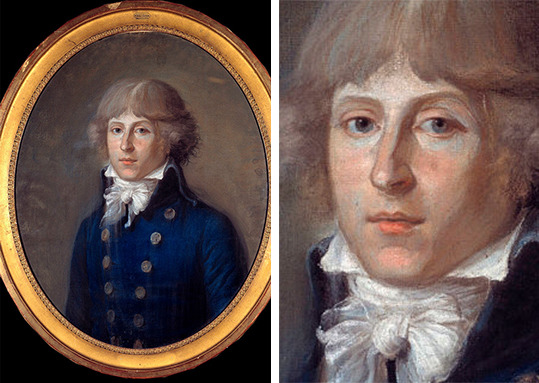
And while the person depicted in that portrait is not unattractive, I don’t think he’s the stunningly handsome youth posterity has made him out to be.
David used Saint-Just’s portrait lent to him by Le Bas’ widow to create this medal:

Élisabeth Le Bas, who had personally known Saint-Just, approved of the medal and said it looked like him. So we have a direct portrait and a post-mortem profile to guide us. In his excellent biography of Saint-Just, Bernard Vinot writes:
Rarely has the physical appearance counted so much for a statesman. History has seized his archangel image and since then, all sensibilities are kneading this hermaphroditic beauty, at the discretion of fantasies or interests.
This beauty is convenient for his admirers. Why should they be embarassed by the feminine appearance of a hero of which Lamartine wrote that he charged into battle at the head of the republican squads and threw himself into the melee with the recklessness of a young hussar? Is it forbidden to be beautiful when one is brave?
This beauty is also convenient for his detractors. If he had been ugly, they would have compared him to the devil, but if he was beautiful, they could present him as the incarnation of the devil’s tricks and never ceased to underline the impressive efficiency of vice when associated with grace.
So, was Saint-Just really beautiful?
His contemporaries’ testimonies do not always coincide. His sister Louise evoked his “great beauty” to her young children, while Lejeune, the friend from his youth, spoke only of his “honest physiognomy”. His colleague Levasseur de la Sarthe called him “weak of body” while Camille Desmoulins insists on his rigidity: “You can see in his gait and his bearing that he regards his head as the cornerstone of the Republic and wears it on his shoulders with the respect reserved to a holy sacrament.”
Finally, Paganel, a member of the convention, offers us a more detailed portrait: “Of average size, a healthy body, proportions which expressed force, a big head, thick hair, a bilious complexion, small and lively eyes, a contemptuous gaze, regular features and austere physiognomy, a strong but veiled voice with a general hint of anxiety, the somber accent of preoccupation and defiance, an extreme coldness in tone and manners, this is how Saint-Just appeared to us, not yet thirty.”
Outside the familial tradition, all these memories are not very convincing. Others were gathered much later from the survivors of the revolution. Thus Mignet said: “He had regular face with big features with a strong and melancholic expression; a penetrating and fixed gaze; his hair was long, flat and black.” Lamartine also insists on his “hair falling on both sides on his collar, on his shoulders.” If Erkmann-Chatrian sees him as “small and blond, with a very beautiful figure and generally very well dressed, but rigid and prideful” Lamartine shows him “unmoving at the tribune, as cold as an idea, (...) the calmness of absolute conviction spread over his almost feminine features, compared to Saint John the messiah of people by his admirers.”
Bernard Vinot draws attention to the fact that most people who had known the young revolutionary personally and had described him during his lifetime (including his close friends) were not really in awe of his supposed beauty - in fact they did not describe a stunningly handsome man, but rather someone who looked acceptably handsome and had youth and a good sense of fashion on his side. His sister had loved him and lost him when he was still a young man, and one is always inclined to see loved ones, especially those tragically departed, through a kinder lens. The inevitable conclusion is that the farther away we get from the Revolution, the more angelically handsome Saint-Just becomes. Bernad Vinot continues:
Certainly, the literary testimonies are highly ambiguous! In the years following the revolution, beauty and youth would often be associated with Saint-Just. Without any doubt, paintings and engravings depicting elegant young men, with or without cravats, were qualified as “presumed portraits of Saint-Just”. This is probably the case of the beautiful picture attributed to Christophe Guérin, preserved in the Carnavalet Museum, of which nothing indicates that it has a connection with Saint-Just.

However, the numerous representations made after the death of the young revolutionary - such as the medal and bust by David d’Angers or the engraving of Bosselmann the Younger, ordered to serve as illustration of Lamartine’s History of the Girondins - they all attest to the fact that the myth of the archangel had already imposed itself.

The Bonneville engraving should also draw attention. This artist was specialized in drawing the revolution’s most famous figures, and his work is precious nowadays. The portrait he made of Saint-Just is the only one, to this day, which designates him by name, title and place of birth (albeit incorrectly) and year of death: it is thus without a doubt almost contemporary.

Saint-Just is portrayed with his neck bared, his features hardened, his nose strong, resembling that of his father, with an expression dominated by vulgarity. In this image, we recognize the model of David or Greuze but aged (especially since the word is applied to a tired 27 year old man) and without his usual cravat. Furthermore, this engraving which came out in 1796, in the middle of the Thermidorian reaction, has the merit of being without favoritism. [...] Perhaps unintentionally, Bonneville has done Saint-Just a service by showing that his neck was not marked by cold humors, as Michelet called them (infectious manifestations caused by tuberculosis), which his detractors attributed to traces of debauchery.
So we have several portraits depicting Saint-Just in various stages of fatigue, with his earlier ones showing him at his best. But can we judge for ourselves whether they were accurate? We certainly can. Let’s begin with his family. Portraits of Saint-Just’s father, mother and sister survived to this day, allowing us to get an idea of his genetic material:
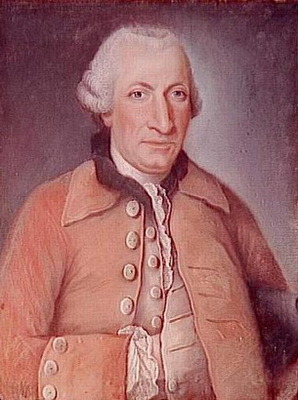

As we can see, both his parents had long faces, with strong noses and chins. Saint-Just’s sister Louise inherited these features:

We can even go one generation down, in 1856 - behold a portrait of Saint-Just’s nephew, Constant Camille Decaisne, the son of one of his sisters:
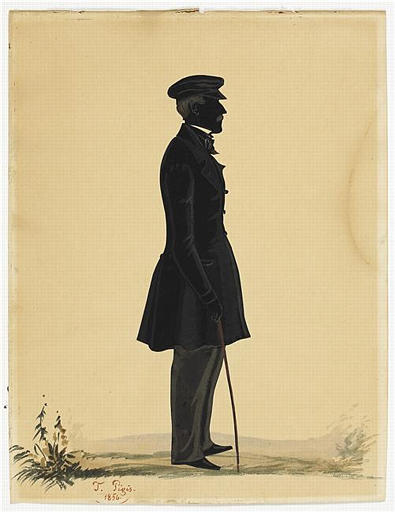
Of course, the Saint-Just genes are here mixed with the ones of Mr. Decaisne’s father, but one can recognize perhaps the long nose and chin so typical of Saint-Just’s family. Bernard Vinot concludes that Louis-Antoine had inherited the “big features” of Saint-Just and Robinot, his parents: long face, long nose, long neck, softened by youth and beautified by a confident clothing style. Without a doubt, age would have deepened these features. If he had lived, he would have resembled his father more and more, and would have gained the masculine, strong and serious - but not beautiful - allure of Louis-Jean. This natural evolution, accentuated by the harassing days and sleepless nights at the Committee of Public Safety and the armies, was probably visible in 1793. Furthermore, the personality was sufficiently mobile and the expression was sufficiently changed by the momentum of passion and burden of responsibility to be perceived and reflected differently. It’s only normal that Saint-Just’s portraits were not perfectly similar.
In conclusion, it is most likely that Saint-Just was not particularly beautiful or feminine. If anything, Saint-Just would have probably been dismayed that his physical appearance is one of the things people remember him most for - this is not the immortality that he was imagining when he was writing: I despise the dust that forms me and speaks to you. This dust you may persecute and kill, but I defy you to rob me of that independent life I have given myself in the ages and in the heavens.
He wanted to be remembered as a man of character, action and virtue, not as the effeminate pretty boy we have turned him into. Do you want to do Saint-Just a favor? Stop mentioning the angelic good looks he very likely never had. Mention how incredibly brave he must have been to throw himself into battle, he who was essentially a government official, in a time where you could expect a lifetime of physical pain at best from acquiring a battle wound. Talk about his genius for organization, his unwavering loyalty, his temper, his occasional dishonesty - give him credit for what he wanted to be given credit... his life’s work.
Fame is an empty noise. Let us put our ears to the centuries that have gone: we no longer hear anything; those who, at another time, shall walk among our urns, shall hear no more. The good - that is what we must pursue, whatever the price, preferring the title of a dead hero to that of a living coward.
150 notes
·
View notes
Text
Twenty Years Later | Postpartum Support International (PSI)
New Post has been published on https://depression-md.com/twenty-years-later-postpartum-support-international-psi/
Twenty Years Later | Postpartum Support International (PSI)

Twenty Years Later – The story behind the Yates Children Memorial Fund
Written by: Vanessa Park Told by: Mary Parnham
When Noah, John, Paul, Luke and Mary Yates woke up in their Houston, TX home on June 20, 2001, they did not know it was to be their last day on earth. But it was. The events of that day ripped through countless lives, hearts, and homes, leaving a trail of mourning and disbelief. In the 20 years since, much has transpired.
What I know, and what others in the legal and mental health professions understand, is that the children’s mother, who ended the lives of Noah, Paul, Luke, and Mary, loved her children more than her own life and truly believed she was saving them.
Andrea Yates was not, and is not, a monster. The only monster in the house that day was postpartum psychosis, a rare mental illness but one with distinct warning signs and symptoms, though few recognize them, even many medical and mental health clinicians.
The tragedy—for tragedy it was—could have been avoided. Here’s the story.
Twenty years ago, when word of this tragedy was released by news outlets in Houston and across the country, most people, including those of us in the local criminal justice system, were horrified and numb. Really? Were we hearing this correctly? That mother must be pure evil to have done such a thing. Some people even called for Andrea’s immediate execution—without a trial. She didn’t deserve one.
That brings us to the second monster in the story. Ignorance.
The law firm my husband George Parnham and I operate in Houston was contacted on official business regarding the Yates murders. Would George take Andrea’s case? That momentous day, he said yes. George had heard the story on the news already, and, like any red-blooded defense lawyer, he hoped he’d get the call. Let’s be honest—it was obviously going to be a huge case. Little did any of us know it would be a groundbreaking case, as well.
As eager as we were to dig in, neither George nor I took what we’d agreed to lightly. Andrea’s case was already being tried ruthlessly in the media, a situation that dogged us throughout and certainly did not help. Within a day of George’s name becoming linked with Andrea’s as her attorney, our office received over 150 media calls in one weekend. That was our first reality check. Life, as we knew it, would never be the same.
Houston had experienced a devastating tropical storm just prior to June 20. Our jail and courthouse systems had been displaced by flooding and other consequences of the storm. As we prepared our case that summer, this fact just made things a little harder than they already were.
The competency hearing was scheduled on September 11. The timing and circumstances guaranteed this was a recipe for disaster. Oil companies in downtown Houston were abandoning their offices and buildings that day, while the media from all over the country were camped out to witness the hearing. Mass transit was at a halt, and the countless reporters who needed to get back home, to New York or LA or wherever they were from, quickly realized they might be stranded. Houston that day was a full-fledged hot, humid, immobilized big-city nightmare.
Looking back, I’d say that post-storm Houston evacuation coinciding with our competency hearing foreshadowed the challenging journey that lay ahead for us all.
Despite strenuous efforts to develop a robust insanity defense for Andrea, when we went into the first trial early in 2002, we still knew too little about the facts of postpartum psychosis (as we later realized). The jury found her guilty of capital murder, entirely rejecting our defense. The State had sought the death penalty. Fortunately, the jury chose to spare her life.
It’s worth noting that, once her psychosis was treated and had abated, Andrea was fully aware of her actions, their consequences, and had to live every day of her life with the unbearable pain of knowing she had killed her own children—who gave her life meaning and provided her with what little joy she found in an otherwise lonely life. Regardless of her illness, the verdict, and any facts that came to light after June 20 of 2001, Andrea Yates would never forgive herself.
In the aftermath of the shattering verdict, there was one idea that George and I could not let go of—there must be a way to avoid these tragedies in the future. There must be a way to educate and bring awareness to an oblivious public—the people who sit on our judicial benches and make up our juries, the new moms and dads bringing children into the world, medical practitioners who likely have never seen a case of this rare mental disorder in their careers.
Knowledge is power. The public has to be made aware that misdiagnosed and untreated mental illness was the culprit here—not mom.
We found our way to Mental Health America of Greater Houston and the Yates Children’s Memorial Fund (YCMF) was created. Our mission was “to raise awareness about postpartum illness for the benefit of mother, child, and family.” We flourished for some time in the greater Houston area and our list of milestones was impressive. We were also successful in having Andrea’s case reversed in the appellate process. We were granted a new trial—a second bite of the apple, so to speak.
We knew from the start of the second trial that the State could not seek the death penalty this time around, since it was rejected by the first jury. So, thankfully, that part of the trial was not in dispute. Almost five years had passed since the tragedy. YCMF had been circulating in the community and we truly believed that this time we would have a more aware, more educated jury pool. This trial was long, as the first was, but the difference was the amount of time the jury spent in deliberation. There was no hours-long rush to a verdict as there was the last time. The jurors took two and a half days to deliver a reasoned verdict: Not Guilty by Reason of Insanity.
Wow. It worked! We did it!
Interestingly, Andrea hadn’t wanted us to try her case a second time. She had little recollection of the first trial due to her mental state at the time. Five years later, she was perfectly sound of mind and painfully aware, so that the presentation of all evidence, day in and day out, was bound to be very hard on her. (And it was.) But George convinced her. He helped her believe in herself, and that she was strong enough to do it. He also convinced her it would be worth it. All the work, learning, interviews, research, and planning that he had done over five years to prepare for this moment made him confident we would prevail this time around.
And he was right.
Andrea, of course, still suffers the loss of her children, the weight of which none of us who have not experienced such a thing can ever imagine. However, rather than languishing as a felon in prison, she is being well cared for in a clinical setting. She keeps as busy as she can and waits for the day when she will be reunited with her children.
Andrea has become our dear friend. As close as we are to her, George and I fully realize that, to Andrea, everyday life is a kind of living nightmare. But her faith, fortitude, and desire to be reunited with her babies keeps her going—keeps her alive.
But justice for one is not justice for all. We realized more and more that we needed to expand our efforts and advocate, educate, and engage on a broader scale. As if someone overheard our prayers, we were able to do just that, but in the strangest of ways.
Weather disasters are part of living in the Gulf Coast Region, and three years ago we were directly impacted by Hurricane Harvey. (The worst flooding Houston has ever seen.) As part of its aftermath, Mental Health America was moving in a different direction with post-Harvey grants. In other words, our funding dried up. YCMF lay virtually dormant. But Postpartum Support International (PSI) took up the reins and welcomed YCMF to its family as the PSI Yates Children Memorial Fund Justice and Advocacy Program. A mouthful, yes—but music to our ears. The direction has shifted a bit from YCMF’s first iteration, but the fit with PSI is indeed perfect.
The PSI Justice and Advocacy Program was developed out of the need to provide education and awareness of the plight of mothers who were implicated in the criminal justice system for infanticide or filicide. The goals of the program are to provide support to families and resources for professionals involved with cases concerning perinatal mental illness in the legal system. The list includes law enforcement, first responders, attorneys, maternal mental health expert witnesses, and psychiatric providers.
We’ve all heard it—tragedy begets change. But change is still too slow to suit me.
Andrea was not the first mother suffering from PPP to be unjustly convicted of murder, nor, unfortunately, was she the last. Twenty years later, the headlines keep coming and moms keep suffering and children are still victims. And yet, in spite of everything, we do believe our efforts have made a difference. But we have only scratched the surface of this problem in the US justice system, which falls far behind other developed nations in terms of its legal handling of maternal mental illness.
Until these tragedies become extinct, our work is not and will not ever be concluded.
We ask you to renew your commitment to make change—to educate—to reach out—to encourage—to shatter the awful stigma around mental health—and to speak up for change. We know so many who advocate for change in the world of maternal mental health have had their own experiences. And to all of you, we see you, we hear you, and we thank our lucky stars that you made your way to PSI and work to encourage and engage in our mission. We couldn’t do this work without you.
PSI provides support, resources and referrals for those who suffer from Postpartum Psychosis and other Perinatal Mental Health Disorders. If you want to learn more about Postpartum Psychosis, or need help for yourself or a loved one, you can find more information about symptoms and resources here or contact the PSI HelpLine at 800-944-4773.
document.addEventListener("DOMContentLoaded",function()!function(f,b,e,v,n,t,s) if(f.fbq)return;n=f.fbq=function()n.callMethod?n.callMethod.apply(n,arguments):n.queue.push(arguments);if(!f._fbq)f._fbq=n;n.push=n;n.loaded=!0;n.version='2.0';n.queue=[];t=b.createElement(e);t.async=!0;t.src=v;s=b.getElementsByTagName(e)[0];s.parentNode.insertBefore(t,s)(window,document,'script','https://connect.facebook.net/en_US/fbevents.js');fbq('init','266788744479875');fbq('track','PageView');); Source link
0 notes
Text
Episode 6: My Resolutions
12/31/2020
Resolution.
It’s an interesting word. It denotes both “end” and “beginning”. On this, the last day of the year, I’m sitting in my parents’ living room, glass of iced tea close by, MacBook open in my lap, reflecting on 2020. But…I think we all have done enough reflecting of this dumpster fire of a year, so I’m just gonna skip that part. Let’s look ahead to 2021.
Seriously, though, as I’ve said in previous posts, 2020 was a year of monumental personal change for me. So, with that in mind, here’s my resolutions for 2021:
1. I want to be a better Christian. There’s a lot packed into this resolution, but, basically, I want to have a better relationship with God. For the last few months I’ve been using work as an excuse for not having enough time each day to do personal devotions and prayer. And while I have been super busy with two full time jobs, I have had a few minutes here and there where I could have spent some time reading in the Bible app on my phone. I surfed social media instead. I also have had some time at the end of the day before bed when I could have done a devotional and some praying, but, again, I either surfed social media or watched a half hour of something on Hulu or Netflix.
So, for 2021, I am resolving to read my Bible more, pray more, and build up my relationship with my Lord and Savior. A month ago, on black Friday, I purchased a couple different study Bibles that were on sale for the app on my phone and iPad. One of them is a men’s study Bible that is designed and set up as a one year, daily devotional Bible. Each night, before bed, I will use that half hour to read and pray.
2. In that same vein, I am resolving to join a church in 2021. I’ve been doing a little research of local churches online, and I found a Lutheran church here in Vegas that appears to be gay friendly while, at the same time, doctrinally sound. By that I mean that it appears to be close to the same doctrinal beliefs as the Baptist church that I grew up in. My religious beliefs/convictions are very much Baptist, with the exception of their view on homosexuality. However, I don’t want that to be the only criteria for my selection of a church, obviously. And this will be predicated on whether or not life as we know it goes completely back to normal this coming year. That means no statewide lockdowns and no mask and social distancing mandates. Soooooo…yeah, this might be one resolution that doesn’t get fulfilled until much later in the year, or maybe even in 2022. Ugh! (But still keeping my fingers crossed.)
Also, my secret hope is that by completing this resolution, I will also be well on the way to completing Resolution #5.
3. I resolve to explore further the issue of homosexuality and Christianity. Due to my hectic work schedule I haven’t been able to devote anywhere near the time necessary to the study and research that this issue requires. But, in 2021, I will be devoting more time to this project. I’m thinking that the more time I devote to Resolution #1, I will also be making progress on this resolution. Stay tuned for updates on here…
4. As part of Resolution #1, I am resolving to be more compassionate and understanding with everyone around me and those I meet in my daily life. For the last week or so, as I’ve been up in Idaho on vacation, I’ve had more time to think and reflect on this past year. Looking back through my posts on social media, especially on Facebook, I realized that I have been VERY judgmental of people – both on my friends list as well as the various politicians and leaders who have been involved in the many social and political issues that have plagued our nation in 2020. I allowed myself to get caught up in the political storm, and I did more than my fair share of yelling, screaming, and smug finger-pointing that I have often despised in others over the last few years.
One of my favorite albums by Amy Grant is her 1988 Lead Me On. If memory serves, I first bought that CD around 1990 or 91, and, as with everything else in her library since 1985’s Unguarded, I had the entire Lead Me On LP memorized by the end of junior high. Later, as an adult, when I burned or downloaded all her albums in iTunes, I would “dust off” those songs every once in awhile over the last couple decades, revisiting old, familiar lyrics and memories while commuting to work or at the gym. One of the songs on Lead Me On is called What About The Love. The narrator spends most of that track pointing a finger at others and judging them for not showing the love, compassion or mercy of Christ. Then, in the last verse, the narrator looks in the mirror and realizes that he/she has been guilty of the very sin that he/she has been judging others for committing.
That’s how I’ve been feeling for the last couple weeks. I have stood on my pedestal, looking down upon the world, judging and smugly condemning everyone around me on social media for being ignorant, or uninformed, or just downright stupid simply because they believed differently than I on this or that issue. I have shaken my fist at the sky, ranting and raving about COVID-19, the national election, BLM, and many of the other social and political issues that tossed and turned our nation inside out these last 9 months.
For 2021, I resolve to be less judgmental, less angry, and more compassionate and understanding. That doesn’t mean I’m going to no longer stand up for my beliefs or convictions, and I will continue to speak my mind, but I will not do as much angry yelling as I’ve done in 2020. One of the major changes for me, personally, in 2020 was that I woke up from my 20-year complacency. Before this year, I never cared much about who was sitting in the White House, or what laws congress passed. But now, I care very much about those things, and I believe it’s important now, more than ever, for ALL American citizens to care as well. For this coming year – and from now on – I promise to be less confrontational and judgmental in my social media posts. Instead, I’m going to be more professional, calmer and understanding while stating my opinion. I’m also going to pause and ask myself the following before posting something: is this just to poke the hornet’s nest, or do I honestly have something to say and/or contribute to this or that debate?
Along those same lines, I resolve to be more sympathetic and understanding with the people I meet in my daily life. One of my biggest weaknesses is my impatience and judgment of others, especially my customers. Nothing infuriates or exasperates me more than trying to help an elderly man/woman who has no idea how to go about accessing their bank statement online. Or when people ask what I consider to be dumb or redundant questions. Or people who insist on splitting up what should be a simple, 2-minute transaction into a 10-minute, 5-part transaction. Or people who –
You get the idea. For 2021, I resolve to stop silently cursing and judging those people. Instead, I will take a deep breath, smile, and be more sympathetic and understanding. I have always had to remind myself that not everyone is as adept as me at current technology, or maybe they don’t know as much about the products they’re purchasing as I do. I’ve been selling money for 8 ½ years now. I’ve used the same script for explaining a payday loan every day, multiple times a day, for 8 ½ years. I sometimes forget that new customers are not as versed as I am, and I need to be more patient and understanding with them.
I also need to be more kind and patient with my co-workers for the same reason, especially the new people. Another of my weaknesses has been my impatience with those to whom I’m tasked to teach new things. (This is the main reason I had to quit my job as a computer assistant at an elementary school in 2012. I made too many young children cry. Literally. I’m not kidding.) For 2021, I resolve to be more patient and understanding with my co-workers. I will keep my frustration and exasperation to myself. Instead, I will pause, take a breath, and try to see the situation from their point of view. There’s a meme I’ve seen a lot on Facebook recently that says something to the effect of, “Treat everyone you meet today with kindness and love. Everyone is going through something in their life, and you don’t know what it is. So be nice.” I promise to take that advice to heart every day from now on.
5. I want to find a man. And not just any man. I have a specific set of criteria, both physical and characteristic, that I want in my future husband. To me, dating is no different than applying for a job. I have a position that I’m seeking to fill, and all prospective applicants need to meet a certain set of standards and qualifications. (And let’s be honest: is there really much of a difference between dates and job interviews? Other than the fact that some dates might end with sex?)
But, seriously, folks, I want someone to love. I’m honestly not sure why this has become such a hunger for me these last few months, but I’ve been longing for some time now to share my life with someone special. The funny thing is, I’ve never cared about this before. I was perfectly happy just doing my own thing, but, lately, I’ve had a very strong yearning for all that clichéd relationship crap, or, as I saw in a social media meme awhile back, “…that special someone you want to annoy for the rest of your life.”
I could write a whole blog post about this (and maybe I will at some point), but I think I’ve officially discovered the 10th circle of hell: online dating. I’m sure Dante wrote a whole ‘nother book about it, but his publisher at the time thought it too frightening for the 13th century common man, so it was left out of The Divine Comedy. I’m honestly not sure that anyone in real life has ever found their soul mate – or even a normal, well-adjusted person – on eHarmony, Tinder, Plenty of Fish, or Match.com. I’ve even resorted to using Facebook’s dating section, which I didn’t know about until a month ago when a co-worker mentioned it. So far, no luck. The main problem I have with most of the major dating apps out there is that you have to plunk down anywhere from $30 - $150 just to be able to respond to ads and/or private messages. I gave Tinder, POF, and Match.com a single month’s subscription trial, but I didn’t meet anyone worth more than a few words in DM, let alone anyone who came close to meeting even the basic of my standards and criteria.
I’m scared that my only chance for “true love” is to meet someone in real life, and that’s not good. I work for a payday loan company and Walmart. I can tell you with absolute assuredness that those meet-cutes in every stupid Hollywood rom-com NEVER happen in real life. Never! Ever! Never ever! And I dare any of you to challenge me on this. The customers and co-workers that I interact with every day are not eligible soul mates, and since I have never been anything close to a social butterfly (even before 2020 when anything social and extra-curricular was shut down), my chances of meeting that special guy face to face are pretty slim.
But, as part of Resolution #1, I’ve decided to put this resolution in the hands of God. If it is His will that I meet that special guy, He’ll find a way to bring him across my path. I just hope that I’ll be ready. In the meantime, I have decided to be patient and just live my life as normal. If the absolute craziness of 2020 has taught me anything, it’s patience. Life is unpredictable, and you never know what each day might bring.
So there they are: my New Year’s resolutions. I can tell you right now that I will fail at some point throughout the year with each one of these (except maybe #2). But the point of resolutions is to commit to the struggle, even – and especially – when we fail. I’ll keep you posted on here on my progress, and I hope this encourages all of you to commit to your own resolutions.
After all, a struggle – like fine wine – is best shared with friends.
1 note
·
View note
Text
Cienfuegos and the US-Mexico firestorm
New Post has been published on http://khalilhumam.com/cienfuegos-and-the-us-mexico-firestorm/
Cienfuegos and the US-Mexico firestorm

By Vanda Felbab-Brown In an extraordinary break with decades of U.S. law enforcement practices, the United States last week agreed to drop drug trafficking charges against Mexico’s former Minister of Defense Gen. Salvador Cienfuegos and release him from U.S. custody. In doing so, the Trump administration made a political decision to subordinate justice and legal proceedings to the foreign policy objective of preserving a less fraught relationship with United States’ vital partner and neighbor, Mexico. Outraged by the surprising arrest of Cienfuegos in Los Angeles on October 16, the Mexican government of President Andrés Manuel López Obrador has hailed the cancellation of the charges as a major diplomatic victory. But the seeming victory casts a long and uneasy shadow over the upcoming relationship between the López Obrador administration and the administration of President-Elect Joseph Biden. If Cienfuegos is meaningfully prosecuted in Mexico and sentenced, a decade and half of efforts to strengthen Mexico’s justice system may yet be vindicated. If the promised, but not certain investigation by the Mexican government or prosecution falters, the episode may well turn out to be a devastating indictment of the persisting high-level corruption, rule-of-law weakness, and impunity in Mexico. When U.S. law enforcement agents nabbed Gen. Cienfuegos as he landed at the Los Angeles airport, shockwaves followed. The immediate shock was of the continually immense reach of Mexico’s vicious drug trafficking groups into the highest levels of the Mexican government. Cienfuegos was charged with drug-trafficking and money-laundering counts and accused of collaborating closely with the brutal H-2 cartel (a descendant of the Beltrán Leyva Cartel). Although serving as Mexico’s highest military official and, given the role of the Mexican military policing, also a top law enforcement official, Cienfuegos allegedly directed Mexican law enforcement actions away from the H-2 cartel and against its drug rivals. As per the U.S. indictment, he promoted and enabled drug trafficking of the H-2 cartel, not put off even by its highly murderous ways. For decades, drug-trafficking-related corruption in Mexico has infected top law enforcement and government officials, including many generals. Hopes that Mexico may find the will and capacity to end this extent of corruption have been fading over the past year, as the United States indicted and arrested on drug trafficking charges other apparent leaders of Mexico’s anti-cartel efforts, such as former Secretary of Public Security Genaro García Luna and his close government associates. Many state-level officials in Mexico have been found to be on the narcos’ payroll in recent years also. But the initial shock of astounding corruption was soon transformed into a different shock — to the U.S.-Mexican bilateral relationship. A nationalist uninterested in confronting Mexican drug cartels through law enforcement (unless under U.S. pressure such as after visible cartel murders of U.S. citizens in Mexico), López Obrador rapidly demurred at the arrest. Instead of focusing on anti-corruption and the rule of law, López Obrador stoked nationalist outrage. Accusing the United States of violating Mexico’s sovereignty, he demanded to see evidence against Cienfuegos and his release. Though bending backward to accommodate Trump’s brutal anti-immigration policies and complaining little about Trump’s highly-inappropriate threat of U.S. tariffs on Mexican goods, the Mexican government all of a sudden found its spine in the relationship with the Trump administration. It threatened a rupture in military-to-military relations between the United States and Mexico (collaboration that only started taking off in the 1990s, far later than with any other Latin American country) and denial of access to Mexico for U.S. law enforcement agents. Beyond nationalist credentials and a record of disinterest in going after the cartels, López Obrador has had other reasons to allow the United States try Cienfuegos. Although posturing as rejecting the militarization of Mexico’s policies under his predecessors, the Mexican president has developed very close ties with the Mexican military, relying on them for everything from fielding troops to staffing the new National Guard to building luxury apartments (through juicy contracts for the military). Specifically, López Obrador embraced the Army branch (SEDENA) of the Mexican military, minimizing the role and influence of the Navy branch, SEMAR. For years, the United States has favored SEMAR as the preferred law enforcement partner against Mexican drug trafficking groups, judging SEMAR to be more competent and less corrupt than SEDENA. SEDENA must be pleased that López Obrador coerced the Cienfuegos release, out of loyalty to its former leader but also because the military branch (long closed to outside scrutiny and rejecting transparency) has limited interest in having further revelations of drug-and –crime related corruption exposed. Just as García Luna did not collaborate with Mexican drug cartels alone, it is not unreasonable to suspect that Cienfuegos involved some of his associates in the military. But Mr. García Luna must wonder why the López Obrador administration did not orchestrate his release on the same grounds: of the United States violating Mexico’s sovereignty and inadequately collaborating with Mexican law enforcement counterparts, and wanting to show that Mexico’s justice system is now robust enough to handle the investigation and prosecution. Because he was a member the Felipe Calderón administration that López Obrador deeply dislikes and vilifies? López Obrador has thus had many political reasons to press for Cienfuegos’s release. But why did the Trump administration (normally enamored of tough posturing, bombastic statements, and outsized threats) yield in the manner it did, and in giving up a high-level former government official indicted for such serious organized crime activities, break with decades of U.S. international law enforcement practices? We will not know the full record for some time, until credible detailed leaks about the considerations of the Trump administration emerge; or perhaps for decades, until the records of the Trump administration (however meager and partial) are declassified. Many López Obrador supporters are promoting on social media the idea that the U.S. law enforcement case was weak and the United States handed Cienfuegos over because its evidence was inadequate, seeking to avoid the embarrassment of a U.S. trial failing. However, that is extremely unlikely. Gen. Cienfuegos has not been tried and convicted and thus must be presumed innocent. But the claim of insufficient U.S. evidence confuses the record of Mexico’s weak justice system with that of the United States. It is in Mexico, not in the United States where impunity for serious crimes, including homicides, remains over 90 percent and where even trials of major criminals and top government officials collapse. Not since early prosecutions of organized crime figures in the U.S. in the 1930s through 1950s periods, have such major prosecutions collapsed in the United States. U.S. prosecutors would not have brought the case to indictment and arrest without the evidence being water-tight. Whether it has been trials of Colombian drug lords and paramilitary dons such as Don Berna, or Mexican traffickers such as Vicente Zambada Niebla and Joaquín Guzmán Loera El Chapo, or U.S. Cosa Nostra capos, global arms smugglers such as Viktor Boot, the U.S. prosecution has won. The U.S. justice systems make plea bargains, but that’s very different than U.S. prosecution failing. In fact, the plea bargains work because the U.S. prosecution cases are strong. What has been revealed about the basis of the U.S. evidence and indictment against Cienfuegos is years of diligent and painstaking work, extensive wiretaps and other methods, which have been shielded from the Mexican government and law enforcement agencies for fear (absolutely justifiable and reasonable) that sharing the intelligence with Mexico posed high risks of it rapidly leaking out. One can only imagine the disappointment of U.S. prosecutors and law enforcement officials, working on the case and perhaps risking their safety. Also the anger and frustration of honest Mexican law enforcement officials who face immense risks of torture and death to themselves and their families when they seek to combat crime and corruption in Mexico and with determination collaborate with the United States. The stakes of the political deal that the Mexican government struck with the Trump administration are high: Preserving the presence of U.S. law enforcement officials in Mexico is important, as is maintaining military-to-military relations. One individual, particularly one that is no longer in government and thus has less ability to direct and enable high-level government complicity, may not be worth sacrificing the broader government-to-government and institution-to-institution relations. Mexico might have also threatened other dimensions of its collaboration with the Trump administration -namely, kowtowing to Trump on migration issues. To appease Trump, the López Obrador administration has suppressing migration to the United States at both Mexico’s northern and southern borders, tolerated swift deportation of Mexican nationals, and put up with holding U.S. asylum seekers from other countries in Mexico while they await their U.S. hearings. Suppressing migration and renegotiating NAFTA have been the dominant prisms through which the Trump administration has viewed its relationship with Mexico. Recognizing the stakes, the Trump administration did not have to fold the way it did. It could have resorted to its old thunder of threating tariffs on Mexico or designating Mexican drug trafficking groups as foreign terrorist organizations — two policy moves I oppose but which Trump has repeatedly activated. More usefully, the Trump administration did not have to be satisfied with Mexico’s mere promise to review the evidence that the United States has handed over and eventually investigate (at least thankfully through the Attorney General’s office, not a military tribunal). It could have waited until after the Mexican Attorney General actually indicted Cienfuegos and then handed him over. That would have addressed issues of Mexico’s sovereignty, U.S.-Mexican collaboration, and still allowed the Mexican justice system to demonstrate its presumed new heft. Beyond the loss of U.S. ability to try Cienfuegos, there are other significant costs associated with the U.S. dropping the charges. Holding Cienfuegos in U.S. custody would have allowed U.S. prosecutors and law enforcement agents to interrogate him and gather information on other members of the criminal-political-institutional networks in Mexico. There are also risks that in handing over the evidence package against Cienfuegos, both methods and sources could come under threat. The United States obviously scrubbed the packet and hopefully removed all sensitive information about key informants, sources, and methods; but even so, the chances that vital U.S. law enforcement systems in Mexico will become compromised have grown substantially, all the more so that Gen. Cienfuegos will remain at large. But the U.S. decision also fits into wider patterns of the Trump administration and its surprising relationship with López Obrador. Donald Trump and Attorney General William Barr have long seen the presidency as the highest U.S. law enforcement authority, attributing to the office of the U.S. president expansive executive power. And Trump, who likes to posture as tough on crime, has systematically shown willingness to violate U.S. laws and undermine U.S. institutions and sacred and fundamental principles — from not paying taxes, to violating conflict-of-interest rules, to pardoning convicted criminals of views friendly to him, to refusing to accept his electoral defeat. Trump and López Obrador have also become unlikely pals. Although Trump has – egregiously — characterized Mexican people as criminals and rapists, López Obrador has bizarrely praised Trump for treating Mexico with respect. And López Obrador has refused to congratulate Joseph Biden on his electoral victory. But López Obrador has burned through not just a lot of personal diplomatic capital, but also deep bilateral institutional collaboration in this fight. President-Elect Biden is a statesman who will not put sentiments about personal slights ahead of U.S. national interests. His administration will be committed to strengthening, deepening, and healing U.S.-Mexican relations — including concerns that only sporadically, if at all, interested Trump: violence in Mexico, confronting Mexican drug trafficking groups, fighting corruption, promoting the rule of law as well as democracy and human rights and environmental protection. The Biden administration will not shove these issues under the rug in exchange for the Mexican government suppressing immigration. If the Mexican government diligently investigates and successfully prosecute Gen. Cienfuegos and related evidence does not leak out from Mexican officials to criminals and their corrupt government protectors, the relationship between the Biden administration and the López Obrador government can commence on a strong footing. But if the Mexican investigation is not serious, no indictment is made, or the prosecution collapses at trial, the U.S.-Mexican relationship will be strained.








0 notes
Text
Man In Uniform {Part 8}
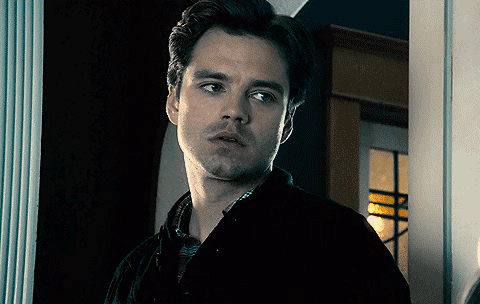
Fandom: Avengers/Marvel
Pairing: Bucky Barnes x Reader
Warning: N/A
Writer: @imaginesofeveryfandom aka @thequeenofthehobbits
Summary/Request: James Barnes is the local neighbourhood cop known for saving cats from trees and walking people home at night. It just so happens that he lives in your apartment building, in the apartment across from yours.
Prologue X, Part 1 X, Part 2 X, Part 3 X, Part 4 X, Part 5 X, Part 6 X, Part 7 X
Man In Uniform Tag List:
@superwholockian5ever @theasparagusawakens
Walking out the hospital on your own two feet, no crutches, no wheelchairs, no hand supporting you, was amazing. To finally have that damned crutch off was amazing. You found yourself running to Bucky’s car a happy laugh leaving you, you were sure you looked strange to those around you, but you honestly didn’t care. There was a freedom in being able to run again, to not be so conscious of the heavy weight of your leg.
“Someone’s happy” He’s grinning at you as slid into the passenger seat and do up your seatbelt. Bucky’s happy to see you so lively, he hasn’t really seen that at all the whole time you’ve been staying in his apartment. You’ve been relatively subdued, struggling to sleep, annoyed at the damn cast on your leg, and generally quite quiet. But he liked seeing this new side of you, the pure joy from something so simple as the removal of a cast.
“I am. I can run! I can walk! I can take a shower properly!” Oh the joys of being able to shower or take a bath without worrying about your cast, without one leg outside the water. The joys of being able to sleep properly and curl up on a sofa without the damn thing getting in the way.
“You coming to the precinct or am I dropping you off at home?” You know you should look at the new leads Bucky has, see if any of the faces he’s pulled up seem familiar. With the cast off you feel a little lighter at the thought of going to the precinct, that and the fact that so many of his colleagues seemed decent. That night out was one that helped you relax and it’d be nice to see a few of them again.
“Precinct, you need me to look at photos, right?”
The ride is filled with idle chit chat, discussions about which pizza toppings are better and which animal could take over the world. It is light hearted and 100% not serious, a far cry away from the conversation you had about his ex-fiance.
The precinct isn’t as busy as you expect it to be when the two of you walk in, a few people being processed and police officers filing paperwork, but generally it seems quite quiet. None of the drama you’d seen on all those cop shows growing up.
“Y/N!” You smile at Natasha and Sam as the two of them reach you. “Look at that! No cast!” Natasha seems just as enthusiastic as you about the removal of the awful thing.
“I know! That thing was awful!”
“Last time I had a cast I went completely stir crazy. They’re such a pain, useful as they are for your bones.” It’s strange that you went from being terrified of ever meeting these people to comfortable and happy talking with them. It was a nice development, you supposed knowing a few police officers was always handy. At some point you’d be back in your own apartment again and wandering around the city on your own.
“I’m glad to be free of it, to be perfectly honest.” Bucky had wandered off to his desk, letting you continue to talk with Sam and Natasha, while he got files out. Part of him wanted this case finished, part of him didn’t because that way you’d always be around.
“You here to look at those pictures for Barnes?” Sam askes and you’re once again reminded that you’re here to do something that you probably won’t even be able to help with. You didn’t really see an identifiable face when you were attacked. The most you really got was that the person in question was light skinned. Strong. You wished you could help more with everything.
“Yeah, I don’t know how much help I’ll be but…” You trail off as your attention is drawn by a feminine voice that grates on your nerves. One of those voices that would sound lovely if it was trying to be snide and stuck up. Your eyes follow the voice to see Dot leaning against Bucky’s desk. His arms are crossed and you can tell he wishes she was anywhere but in front of him.
“I see you’ve downgraded in the company you keep.” There’s a gesture towards you and you smile at her sarcastically. You resist the urge to put your middle finger up at her, although by the looks of Natasha she might just do that for you. If not worse. Natasha was strong, muscular and impressive and it seemed she’d officially grown a soft spot for you.
“I’ve downgraded, really? From a cheat?”
“Maybe if you had been better I wouldn’t have looked elsewhere.” You get the feeling in the back of your neck, the one that says ‘protect’ and you find yourself starting towards the two of them despite the face you knew that Bucky could look after himself. He was a grown man after all.
“Really? You’re trying to blame me? What did I need buy you enough shiny things? Not fulfil your wanton desires? Really, Dot?”
“Maybe you just weren’t man enough?”
“Or maybe you were a selfish, conniving bitch who found an equally shitty man.” You step behind her and watch her turn to you, having the gall to look offended at your words.
“How dare you!” Part of you takes joy in the prissy way she stamps her foot and scowls. Upsetting a horrible person was something that had a small amount of satisfaction. You generally as a rule tried to be nice and appreciated everyone, but that had gone out the window the moment she’d started on Bucky. Heck, the moment you were told she cheated on him.
“Are you going to go cry to your shitty boyfriend who’s an even worse cop? Or no, why would you? All he probably cares about is the thing between your legs.” Part of you feels a little bad, so unused to being mean, but part of you knows she deserves backlash for coming here and trying to upset Bucky. It had been long enough since their break up that she should have just left him alone, but you had a feeling that she enjoyed tormenting him, enjoyed throwing it in his face that she had been with someone else.
“Ugh!” You watch her storm off with a sense of satisfaction. She deserved it. Rumlow did too, unfortunately he could definitely pick you up and throw you into a wall…probably best to stick with defending Bucky from red haired exes than strong ex-partners.
You smile to yourself for a moment, you feel better than you have in a while. There’s a independence, strength you’re finally feeling again. Maybe you can go on after everything, maybe you can go back to your apartment one day and feel okay, feel safe.
"You didn't have to do that." You’re drawn out of your thoughts by Bucky. You turn to see him looking at you with an expression you can’t quite identify. Part of you worries that he’s pissed off, that you shouldn’t have interfered.
"You help me, I help you." You lean against his desk, picking up a snow globe with the Statue of Liberty in it and shaking it up and down. His desk is rather eclectic you notice, all sorts of things he must have collected over the years placed around papers and a computer. You’re sure there’s probably even more things in the drawers.
"That's different...you got assaulted by a burglar."
"Yeah, well you got emotionally assaulted by your ex-girlfriend and he technically is a girlfriend burglar."
"A girlfriend burglar?"
“Yeah. I mean…okay, so technically you can’t ‘steal’ a person, but…” You realise that maybe comparing a girlfriend to a steal-able object isn’t the best thing in the word, but technically it wasn’t inaccurate, right? You could take someone away from someone else….in a sense. Even if in this case the girl chose to go behind his back.
You focus on the snow falling inside the snow globe, still not sure if he’s unhappy that you stepped in, before a hand takes in from you and forces you to look at him. He’s smiling at you softly, like he knows you’re unsure about everything.
“Thank you.” He means it. You know he means it and you wonder if he’d gone so long without others stepping in. He seemed like the type to tell everyone he could handle it even if he couldn’t.
“You’re welcome…so these photos, let me have a look?” You step around to his side of the desk and watch him pull out photo after photo, all mug shots, presumably previously convicted and all women this time.
“If you can rule out any of them…that would be great.” They are an array of all types of women and you quickly rule out a few based on ethnicity alone…but other than that you find yourself unable to do much. You didn’t see the burglar’s face, you didn’t hear their voice or really notice their physical built. You only knew they were light skinned because of the small patch of skin at their neck and wrists that was on display.
You feel rather useless and wish you could be more help. Surely having been attacked you should have known more, but you didn’t. Ultimately you just want the person to be found and want to go back to your normal life. To go back to work and to your apartment.
As much as you adore being around Bucky, you do miss your own space. You’d get your own privacy and so would he and…maybe you could still spend time together after all this blew over. Maybe he’d like to go on a date…being in your apartment again would mean you could finally take the risk and ask him…but not just yet.
#man in uniform#readerinsert#reader insert#marvel reader insert#avengers#avengers reader insert#buckyxreader#bucky x reader#bucky/reader#bucky / reader#bucky barnesxreader#bucky barnes x reader#bucky barnes/reader#bucky barnes / reader
84 notes
·
View notes
Text
With impeachment, America’s epistemic crisis has arrived

The ultimate spin-machine challenge. | Photo by Bonnie Jo Mount/The Washington Post via Getty Images
Can the right-wing machine hold the base in an alternate reality long enough to get through the next election?
Back in 2017, I wrote a piece speculating that the Mueller hearings might bring America’s epistemic crisis to a head. That crisis involves Americans’ growing inability, not just to cooperate, but even to learn and know the same things, to have a shared understanding of reality. We have sorted ourselves into polarized factions living in different worlds, not just of values, but of facts. Communication between them is increasingly difficult.
I wondered what might happen if Mueller offered clear, incontrovertible evidence of Trump’s guilt. Would the right wing be able to prevent its members from ever finding out? What if the truth was revealed but it had no power, no effect at all, because half the country had been walled off from it? What if there is no longer any evidentiary standard that can overcome our polarization?
As it happened, the hearings didn’t play out that way. Mueller’s report and testimony were oddly oblique and muted, with notable omissions. It proved relatively easy for the president and his supplicant media to dismiss the whole thing as a dud.
Now we may experience the stress test that Mueller never produced: whether the right can shield itself from plain facts in plain sight.
Unlike Mueller’s report, the story behind the impeachment case is relatively simple: Congress approved military aid for Ukraine, but Trump withheld it as part of a sustained campaign to pressure Ukraine into launching an investigation of his political rival Joe Biden’s family. There’s a record of him doing it. There are multiple credible witnesses to the phone call and larger campaign. Several Trump allies and administration officials have admitted to it on camera. Trump himself admitted to it on the White House lawn.
REPORTER: What exactly did you hope the Ukrainian president would do about the Bidens? TRUMP: "I would think that if they were honest about it, they'd start a major investigation" https://t.co/oMb1cjsx4T
— Jonathan Chait (@jonathanchait) November 13, 2019
It’s just very, very obvious that he did it. It’s very obvious he and his associates don’t think there’s anything wrong with it. And it’s very obvious there is something wrong with it. Holding US foreign policy hostage to personal political favors is straightforward abuse of power, precisely the sort of thing the Founders had in mind when they wrote impeachment into the Constitution.
It’s a clearly impeachable pattern of action, documented and attested to by multiple witnesses, confessed to multiple times, in violation of longstanding political precedent and a moral consensus that was, until 2016, universal. Compared to Mueller, that is a much more difficult test of the right’s ability to obscure, distract, and polarize.
Right now, the right’s messaging machine is sputtering a bit, cycling through defenses — it didn’t happen, Trump’s not competent enough to do it, it was a failed quid pro quo so it doesn’t count, he did it but it’s not impeachable — that contradict one another from day to day.
Can the machine successfully hold the right-wing base in an alternate reality and throw up enough fog to keep the general public at bay for long enough to get through the next election? It seems challenging, given the facts on record, but this is just the sort of challenge the machine was built for.
Let’s quickly review how we got here.
The rise of tribal epistemology
Earlier in 2017, I told the story of Donald Trump and the rise of tribal epistemology. Epistemology is the branch of philosophy that has to do with knowing and coming to know things — what counts as true, what counts as evidence, how we accumulate knowledge, and the like. It’s where you find schools of thought like skepticism (we can’t truly know anything) and realism (the universe contains observer-independent facts we can come to know).
Tribal epistemology, as I see it, is when tribalism comes to systematically subordinate epistemological principles.

Javier Zarracina for Vox
Tribal epistemology, basically.
Perhaps the easiest way to explain is by way of analogy with tribal morality, which people are more familiar with. Tribal morality is what happens when tribal interests come to subordinate moral principles.
Moral principles are generally, by their nature, cosmopolitan. They are meant to apply across tribal lines, to be “transpartisan.” Take, for instance, the principle “it is wrong to torture.” Interpreted as a principle, it is meant to apply to everyone. Anyone, from any group or nation, who tortures anyone else, from any group or nation, is doing something wrong.
But under tribal morality, principles are subsumed under tribal membership. It becomes, “it is wrong for them to torture us.” It is okay for us to torture them, because our tribe is Good and thus whatever actions we take to prosecute the interests of the tribe are Good. They, however, are Bad, so they are subject to the rules. (Readers of a certain age may recall the US having just this debate in the mid-2000s.)
Tribal epistemology happens when tribal interests subsume transpartisan epistemological principles, like standards of evidence, internal coherence, and defeasibility. “Good for our tribe” becomes the primary determinant of what is true; “part of our tribe” becomes the primary determinant of who to trust.
A circular logic, which has become quite familiar in the impeachment affair, emerges: Anyone who says anything contrary to the tribe marks themselves as an enemy of the tribe (cough *deep state* cough); enemies of the tribe cannot but trusted, so their testimony or evidence can be ignored. Thus, by definition, nothing that questions the tribal narrative can be trusted.
A decades-long effort on the right has resulted in a parallel set of institutions meant to encourage tribal epistemology. They mimic mainstream media, think tanks, and the academy, but without the restraint of transpartisan principles. They are designed to advance the interests of the right, to tell stories and produce facts that support the tribe. That is the ur-goal; the rhetoric and formalisms of critical thinking are retrofit around it.
Talk radio and the birth of Fox News in the 1990s were turning points. They eventually expanded to create an entire, complete-unto-itself conservative information universe. It was capable of cranking out stories and facts (or “facts”) in support of the conservative cause 24 hours a day, steadily shaping the worldview of their white suburban audience around a forever war with The Libs, who are always just on the verge of destroying America.
As I covered in more detail in this post (and this one), over time this led to a steady deterioration in fealty to norms, epistemological and otherwise, to the point that something like 30 percent of the country is now awash in a fantasia of conspiracy theories and just-so stories.
As journalist Alex Pareene wrote in a scathing 2017 piece, the propaganda machine that the right built to keep its base outraged grew out of control and swallowed the GOP. “They’re screwed,” Pareene wrote of conservatives, “because they and their predecessors engineered a perpetual misinformation machine, and then a bunch of people addicted to their product took over the government.”
Sen. John Kennedy is speaking. He says he is a "proud deplorable" and unlike the "cultured, cosmopolitan, goat's milk latte-drinkin', avocado toast-eating, insiders elite."
— Daniel Dale (@ddale8) November 15, 2019
Now everyone with any power on the right is deep in the bubble, right up to the president himself, who spends a considerable portion of his time watching and tweeting about Fox News. There are no more moderates or responsible Republicans behind the curtain, keeping an eye on the difference between tribal tall tales and reality. Fox natives are running the show, including the federal government.
And Trump, the ultimate tribalist, has made it clear that he doesn’t want to hear any of these half-ass stories about how he did something wrong but it’s not that bad. He demands ultimate loyalty, and to him loyalty means insisting that he did nothing wrong at all.
The call to the Ukrainian President was PERFECT. Read the Transcript! There was NOTHING said that was in any way wrong. Republicans, don’t be led into the fools trap of saying it was not perfect, but is not impeachable. No, it is much stronger than that. NOTHING WAS DONE WRONG!
— Donald J. Trump (@realDonaldTrump) November 10, 2019
Following Trump down that path requires ignoring or wishing away mountains of evidence and decades of precedent, opting instead to believe him when he says, “What you’re seeing and what you’re reading is not what’s happening.” This is tribal epistemology in its rawest form: It’s us or them, our story or theirs. If you are one of us, you believe our story.
Republicans need to maintain doubt and prevent consensus
As a recent Crooked Media/Change Research poll showed, voter opinions on impeachment are as inflamed and polarized as they are on everything else. Some 91 percent of those polled have strong feelings on impeachment: 94 percent of Republicans and Republican-leaning independents oppose it; 94 percent of Democrats and Democrat-leaning independents support it. Meanwhile, “50% of independents and 57% of swing voters support removing Trump from office.”
This is the story of American politics: a narrowly divided nation, with raw numbers on the side of the rising demographics in the left coalition but intensity and outsized political power on the side of the right coalition. Put in more practical terms, the right still has the votes and the cohesion to prevent a Senate impeachment conviction.
On the downslope of a fading, unpopular coalition is not a great place for Republicans to be. It doesn’t augur well for their post-2020 health as a party. But it is enough to get them through the next election, which is about as far ahead as they look these days.
All they need to do is to keep that close partisan split frozen in place. Above all, they need to ensure that nothing breaks through to the masses in the mushy middle, who are mostly disengaged from politics. They need to make sure no clear consensus forms, nothing that might find its way into pop culture, the way the entire nation eventually focused its attention on Nixon’s impeachment.
It’s a kind of magic trick they’re going to try to pull off in full view.
Lindsey Graham, the chairman of the Senate Judiciary Committee, says he won't read any of the transcripts, and dismissed Sondland's reversal. "I've written the whole process off ... I think this is a bunch of B.S." Per @alanhe
— Kathryn Watson (@kathrynw5) November 5, 2019
The right has hacked the cognitive biases of voters and reporters
They are working with a few key tools and advantages. The first is a strong tendency, especially among low-information, relatively disengaged voters (and political reporters), to view consensus as a signal of legitimacy. It’s an easy and appealing heuristic: If something is a good idea, it would have at least a few people from both sides supporting it. That’s why “bipartisan” has been such a magic word in US politics this century, even as the reality of bipartisanship has faded.
Republican Senate leader Mitch McConnell was very canny in recognizing this tendency and working it it ruthlessly to his advantage. He realized before Obama ever set foot in office that if he could keep Republicans unified in opposition, refusing any cooperation on anything, he could make Obama appear “polarizing.” His great insight, as ruthlessly effective as it was morally bankrupt, was that he could unilaterally deny Obama the ability to be a uniter, a leader, or a deal maker. Through nothing but sheer obstinance, he could make politics into an endless, frustrating, fruitless shitshow, diminishing both parties in voters’ eyes.
This is what Republicans need more than anything on impeachment: for the general public to see it as just another round of partisan squabbling, another illustration of how “Washington” is broken. They need to prevent any hint of bipartisan consensus from emerging.
Fox guest says George Soros controls the State Department, FBI agents, and wants to control Ukraine using the US government pic.twitter.com/U5vTX3db6M
— Jason Campbell (@JasonSCampbell) November 14, 2019
Tribal epistemology is key to this. Republicans must render partisan not only judgments of right and wrong but judgments of what is and isn’t true or real. They must render facts themselves a matter of controversy that the media reports as a food fight and the public tunes out.
That’s the main reason they are focusing their attacks so intently on process complaints. The investigation itself, the hearings, the whole process must come to be seen as partisan, which will serve as permission for the engaged on the right to attack it, the engaged on the left to embrace it, and the broader public to dismiss it.
Aiding in the effort is the propaganda machine. One of the more notable findings from the aforementioned poll: “89% of Republicans who get most of their impeachment news from Fox oppose the inquiry because they think the allegations aren’t true; 59% of other Republicans say the same.” As I have written before about AOC and the Green New Deal, the right has an ability to convey a partisan message to its base that the left utterly lacks.
As a massive post-election study of online media from Harvard showed, media is not symmetrical any more than broader polarization is. “Prominent media on the left are well distributed across the center, center-left, and left,” the researchers found. “On the right, prominent media are highly partisan.”
Democrats are still dependent on the mainstream press to convey their messages to the broad public. Many of their consultants and press officers still view their role as managing relationships with mainstream reporters. But the mainstream media, catering to low-information voters and reinforcing their worst prejudices in the process, persists in covering politics precisely through the most cynical lens, as a team sport, competing performances to be narrated like an announcer calling a game.
Analysis: The first two witnesses called Wednesday testified to President Trump's scheme, but lacked the pizzazz necessary to capture public attention. https://t.co/1UfkaeZ3I4
— NBC News (@NBCNews) November 14, 2019
Meanwhile, the right not only commands the highest rated cable news network and an army of supportive online media outlets, it is out-spending by millions on Facebook, Tik-Tok, 4chan, and 8chan, targeting messages where their audiences are.
Impeachment is make or break time for America’s epistemic health
As Putin and other modern autocrats have realized, in the modern media environment — a chaotic Wild West where traditional gatekeepers are in decline — it is not necessary for a repressive regime to construct its own coherent account of events. There are no broadly respected, nonpartisan referees left to hold it to account for consistency or accuracy. All it needs, to get away with whatever it wants, is for the information environment to be so polluted that no one can figure out what’s true and what isn’t, or what’s really going on.
The recipe is always the same: attack independent media outlets as partisan enemies of the regime and, by proxy, enemies of the people. At the same time, use the media under state control, along with an army of bots, trolls, and shitposters, to inject accusations, lies, and conspiracy theories into the public dialogue.
In an information fog filled with vexed uncertainty, people will either tune out, revert to their tribal affiliations, or both. They will seek a strong leader who offers simple certainties and a clear account of who is to blame for the chaos. Confusion and fear, not deception, are the ultimate goal.
That is precisely the kind of machine the US conservative movement has built: one designed to produce confusion and fear. Trump is its natural leader, the first Republican president to reflect the party’s contemporary core and character, and his impeachment is its ultimate test.
Meanwhile, Democrats are attempting to do something that arguably nothing since the 9/11 attacks has done: unite Americans in a clear understanding of a threat and a clear will to action, in a way that reaches across conventional partisan lines, at least to some extent.
On their side, they have the products of America’s tattered remaining institutional processes and norms: clear evidence, painstakingly laid out in a Constitutionally prescribed process, communicated through mainstream news outlets. The facts are clearer than ever, but those institutions are weaker and social trust, which the right has been concertedly attacking for decades, is at a low ebb.

David Dee Delgado/Getty Images
Protesters call for the impeachment of President Trump during a demonstration in June in New York City.
In opposition is large but stable minority united by unquestioned loyalty to a tribal leader, dedicated to guerrilla information warfare unconstrained by conventional norms of accuracy or consistency, and motivated by an almost eschatological will to power.
If the latter triumphs, if it is able to muddy and distract enough to make impeachment just another Mueller, just more partisan white noise, we will cross a kind of rubicon. It will demonstrate that, to a first approximation, lol nothing matters.

Giphy
Moral consensus will have become impossible. Epistemological consensus will have become impossible. It will show that no amount of evidence is capable of bridging the partisan gap. The epistemic crisis, and its attendant political crisis, will be fully upon us.
Ultimately, communication, and with it survival as a polity, depends on a shared body of facts and assumptions about the world. For decades, the right has been sawing away at the threads that still connect it to mainstream institutions, procedures, and norms of conduct, to the point that it has created a hermetically sealed and impenetrable world of its own.
As congressional scholars Thomas Mann and Norm Ornstein warned in 2012, the GOP as become “a resurgent outlier: ideologically extreme; contemptuous of the inherited social and economic policy regime; scornful of compromise; un-persuaded by conventional understanding of facts, evidence, and science; and dismissive of the legitimacy of its political opposition.”
The machine was primed and waiting for someone like Trump. Now, with his erratic and indefensible conduct, he is accelerating the breach, pushing the right into ever-more cult-like behavior, principles laid aside one after another in service of power.
That is what a tribalist like Trump wants: for communication and compromise across tribal lines to become impossible, so that loyalty becomes the only measure and everything is reduced to pure struggle for dominance. If he makes it through impeachment unscathed, he and the right will have learned once and for all that facts and evidence have no hold on them. Both “sides” have free rein to choose the facts and evidence that suit them. Only power matters.
If the right’s epistemic break becomes final and irreparable, as impeachment threatens, then no matter what happens in the next election, American democracy is in for a long spell of trouble.
from Vox - All https://ift.tt/2r0hof6
0 notes
Text
With impeachment, America’s epistemic crisis has arrived

The ultimate spin-machine challenge. | Photo by Bonnie Jo Mount/The Washington Post via Getty Images
Can the right-wing machine hold the base in an alternate reality long enough to get through the next election?
Back in 2017, I wrote a piece speculating that the Mueller hearings might bring America’s epistemic crisis to a head. That crisis involves Americans’ growing inability, not just to cooperate, but even to learn and know the same things, to have a shared understanding of reality. We have sorted ourselves into polarized factions living in different worlds, not just of values, but of facts. Communication between them is increasingly difficult.
I wondered what might happen if Mueller offered clear, incontrovertible evidence of Trump’s guilt. Would the right wing be able to prevent its members from ever finding out? What if the truth was revealed but it had no power, no effect at all, because half the country had been walled off from it? What if there is no longer any evidentiary standard that can overcome our polarization?
As it happened, the hearings didn’t play out that way. Mueller’s report and testimony were oddly oblique and muted, with notable omissions. It proved relatively easy for the president and his supplicant media to dismiss the whole thing as a dud.
Now we may experience the stress test that Mueller never produced: whether the right can shield itself from plain facts in plain sight.
Unlike Mueller’s report, the story behind the impeachment case is relatively simple: Congress approved military aid for Ukraine, but Trump withheld it as part of a sustained campaign to pressure Ukraine into launching an investigation of his political rival Joe Biden’s family. There’s a record of him doing it. There are multiple credible witnesses to the phone call and larger campaign. Several Trump allies and administration officials have admitted to it on camera. Trump himself admitted to it on the White House lawn.
REPORTER: What exactly did you hope the Ukrainian president would do about the Bidens? TRUMP: "I would think that if they were honest about it, they'd start a major investigation" https://t.co/oMb1cjsx4T
— Jonathan Chait (@jonathanchait) November 13, 2019
It’s just very, very obvious that he did it. It’s very obvious he and his associates don’t think there’s anything wrong with it. And it’s very obvious there is something wrong with it. Holding US foreign policy hostage to personal political favors is straightforward abuse of power, precisely the sort of thing the Founders had in mind when they wrote impeachment into the Constitution.
It’s a clearly impeachable pattern of action, documented and attested to by multiple witnesses, confessed to multiple times, in violation of longstanding political precedent and a moral consensus that was, until 2016, universal. Compared to Mueller, that is a much more difficult test of the right’s ability to obscure, distract, and polarize.
Right now, the right’s messaging machine is sputtering a bit, cycling through defenses — it didn’t happen, Trump’s not competent enough to do it, it was a failed quid pro quo so it doesn’t count, he did it but it’s not impeachable — that contradict one another from day to day.
Can the machine successfully hold the right-wing base in an alternate reality and throw up enough fog to keep the general public at bay for long enough to get through the next election? It seems challenging, given the facts on record, but this is just the sort of challenge the machine was built for.
Let’s quickly review how we got here.
The rise of tribal epistemology
Earlier in 2017, I told the story of Donald Trump and the rise of tribal epistemology. Epistemology is the branch of philosophy that has to do with knowing and coming to know things — what counts as true, what counts as evidence, how we accumulate knowledge, and the like. It’s where you find schools of thought like skepticism (we can’t truly know anything) and realism (the universe contains observer-independent facts we can come to know).
Tribal epistemology, as I see it, is when tribalism comes to systematically subordinate epistemological principles.

Javier Zarracina for Vox
Tribal epistemology, basically.
Perhaps the easiest way to explain is by way of analogy with tribal morality, which people are more familiar with. Tribal morality is what happens when tribal interests come to subordinate moral principles.
Moral principles are generally, by their nature, cosmopolitan. They are meant to apply across tribal lines, to be “transpartisan.” Take, for instance, the principle “it is wrong to torture.” Interpreted as a principle, it is meant to apply to everyone. Anyone, from any group or nation, who tortures anyone else, from any group or nation, is doing something wrong.
But under tribal morality, principles are subsumed under tribal membership. It becomes, “it is wrong for them to torture us.” It is okay for us to torture them, because our tribe is Good and thus whatever actions we take to prosecute the interests of the tribe are Good. They, however, are Bad, so they are subject to the rules. (Readers of a certain age may recall the US having just this debate in the mid-2000s.)
Tribal epistemology happens when tribal interests subsume transpartisan epistemological principles, like standards of evidence, internal coherence, and defeasibility. “Good for our tribe” becomes the primary determinant of what is true; “part of our tribe” becomes the primary determinant of who to trust.
A circular logic, which has become quite familiar in the impeachment affair, emerges: Anyone who says anything contrary to the tribe marks themselves as an enemy of the tribe (cough *deep state* cough); enemies of the tribe cannot but trusted, so their testimony or evidence can be ignored. Thus, by definition, nothing that questions the tribal narrative can be trusted.
A decades-long effort on the right has resulted in a parallel set of institutions meant to encourage tribal epistemology. They mimic mainstream media, think tanks, and the academy, but without the restraint of transpartisan principles. They are designed to advance the interests of the right, to tell stories and produce facts that support the tribe. That is the ur-goal; the rhetoric and formalisms of critical thinking are retrofit around it.
Talk radio and the birth of Fox News in the 1990s were turning points. They eventually expanded to create an entire, complete-unto-itself conservative information universe. It was capable of cranking out stories and facts (or “facts”) in support of the conservative cause 24 hours a day, steadily shaping the worldview of their white suburban audience around a forever war with The Libs, who are always just on the verge of destroying America.
As I covered in more detail in this post (and this one), over time this led to a steady deterioration in fealty to norms, epistemological and otherwise, to the point that something like 30 percent of the country is now awash in a fantasia of conspiracy theories and just-so stories.
As journalist Alex Pareene wrote in a scathing 2017 piece, the propaganda machine that the right built to keep its base outraged grew out of control and swallowed the GOP. “They’re screwed,” Pareene wrote of conservatives, “because they and their predecessors engineered a perpetual misinformation machine, and then a bunch of people addicted to their product took over the government.”
Sen. John Kennedy is speaking. He says he is a "proud deplorable" and unlike the "cultured, cosmopolitan, goat's milk latte-drinkin', avocado toast-eating, insiders elite."
— Daniel Dale (@ddale8) November 15, 2019
Now everyone with any power on the right is deep in the bubble, right up to the president himself, who spends a considerable portion of his time watching and tweeting about Fox News. There are no more moderates or responsible Republicans behind the curtain, keeping an eye on the difference between tribal tall tales and reality. Fox natives are running the show, including the federal government.
And Trump, the ultimate tribalist, has made it clear that he doesn’t want to hear any of these half-ass stories about how he did something wrong but it’s not that bad. He demands ultimate loyalty, and to him loyalty means insisting that he did nothing wrong at all.
The call to the Ukrainian President was PERFECT. Read the Transcript! There was NOTHING said that was in any way wrong. Republicans, don’t be led into the fools trap of saying it was not perfect, but is not impeachable. No, it is much stronger than that. NOTHING WAS DONE WRONG!
— Donald J. Trump (@realDonaldTrump) November 10, 2019
Following Trump down that path requires ignoring or wishing away mountains of evidence and decades of precedent, opting instead to believe him when he says, “What you’re seeing and what you’re reading is not what’s happening.” This is tribal epistemology in its rawest form: It’s us or them, our story or theirs. If you are one of us, you believe our story.
Republicans need to maintain doubt and prevent consensus
As a recent Crooked Media/Change Research poll showed, voter opinions on impeachment are as inflamed and polarized as they are on everything else. Some 91 percent of those polled have strong feelings on impeachment: 94 percent of Republicans and Republican-leaning independents oppose it; 94 percent of Democrats and Democrat-leaning independents support it. Meanwhile, “50% of independents and 57% of swing voters support removing Trump from office.”
This is the story of American politics: a narrowly divided nation, with raw numbers on the side of the rising demographics in the left coalition but intensity and outsized political power on the side of the right coalition. Put in more practical terms, the right still has the votes and the cohesion to prevent a Senate impeachment conviction.
On the downslope of a fading, unpopular coalition is not a great place for Republicans to be. It doesn’t augur well for their post-2020 health as a party. But it is enough to get them through the next election, which is about as far ahead as they look these days.
All they need to do is to keep that close partisan split frozen in place. Above all, they need to ensure that nothing breaks through to the masses in the mushy middle, who are mostly disengaged from politics. They need to make sure no clear consensus forms, nothing that might find its way into pop culture, the way the entire nation eventually focused its attention on Nixon’s impeachment.
It’s a kind of magic trick they’re going to try to pull off in full view.
Lindsey Graham, the chairman of the Senate Judiciary Committee, says he won't read any of the transcripts, and dismissed Sondland's reversal. "I've written the whole process off ... I think this is a bunch of B.S." Per @alanhe
— Kathryn Watson (@kathrynw5) November 5, 2019
The right has hacked the cognitive biases of voters and reporters
They are working with a few key tools and advantages. The first is a strong tendency, especially among low-information, relatively disengaged voters (and political reporters), to view consensus as a signal of legitimacy. It’s an easy and appealing heuristic: If something is a good idea, it would have at least a few people from both sides supporting it. That’s why “bipartisan” has been such a magic word in US politics this century, even as the reality of bipartisanship has faded.
Republican Senate leader Mitch McConnell was very canny in recognizing this tendency and working it it ruthlessly to his advantage. He realized before Obama ever set foot in office that if he could keep Republicans unified in opposition, refusing any cooperation on anything, he could make Obama appear “polarizing.” His great insight, as ruthlessly effective as it was morally bankrupt, was that he could unilaterally deny Obama the ability to be a uniter, a leader, or a deal maker. Through nothing but sheer obstinance, he could make politics into an endless, frustrating, fruitless shitshow, diminishing both parties in voters’ eyes.
This is what Republicans need more than anything on impeachment: for the general public to see it as just another round of partisan squabbling, another illustration of how “Washington” is broken. They need to prevent any hint of bipartisan consensus from emerging.
Fox guest says George Soros controls the State Department, FBI agents, and wants to control Ukraine using the US government pic.twitter.com/U5vTX3db6M
— Jason Campbell (@JasonSCampbell) November 14, 2019
Tribal epistemology is key to this. Republicans must render partisan not only judgments of right and wrong but judgments of what is and isn’t true or real. They must render facts themselves a matter of controversy that the media reports as a food fight and the public tunes out.
That’s the main reason they are focusing their attacks so intently on process complaints. The investigation itself, the hearings, the whole process must come to be seen as partisan, which will serve as permission for the engaged on the right to attack it, the engaged on the left to embrace it, and the broader public to dismiss it.
Aiding in the effort is the propaganda machine. One of the more notable findings from the aforementioned poll: “89% of Republicans who get most of their impeachment news from Fox oppose the inquiry because they think the allegations aren’t true; 59% of other Republicans say the same.” As I have written before about AOC and the Green New Deal, the right has an ability to convey a partisan message to its base that the left utterly lacks.
As a massive post-election study of online media from Harvard showed, media is not symmetrical any more than broader polarization is. “Prominent media on the left are well distributed across the center, center-left, and left,” the researchers found. “On the right, prominent media are highly partisan.”
Democrats are still dependent on the mainstream press to convey their messages to the broad public. Many of their consultants and press officers still view their role as managing relationships with mainstream reporters. But the mainstream media, catering to low-information voters and reinforcing their worst prejudices in the process, persists in covering politics precisely through the most cynical lens, as a team sport, competing performances to be narrated like an announcer calling a game.
Analysis: The first two witnesses called Wednesday testified to President Trump's scheme, but lacked the pizzazz necessary to capture public attention. https://t.co/1UfkaeZ3I4
— NBC News (@NBCNews) November 14, 2019
Meanwhile, the right not only commands the highest rated cable news network and an army of supportive online media outlets, it is out-spending by millions on Facebook, Tik-Tok, 4chan, and 8chan, targeting messages where their audiences are.
Impeachment is make or break time for America’s epistemic health
As Putin and other modern autocrats have realized, in the modern media environment — a chaotic Wild West where traditional gatekeepers are in decline — it is not necessary for a repressive regime to construct its own coherent account of events. There are no broadly respected, nonpartisan referees left to hold it to account for consistency or accuracy. All it needs, to get away with whatever it wants, is for the information environment to be so polluted that no one can figure out what’s true and what isn’t, or what’s really going on.
The recipe is always the same: attack independent media outlets as partisan enemies of the regime and, by proxy, enemies of the people. At the same time, use the media under state control, along with an army of bots, trolls, and shitposters, to inject accusations, lies, and conspiracy theories into the public dialogue.
In an information fog filled with vexed uncertainty, people will either tune out, revert to their tribal affiliations, or both. They will seek a strong leader who offers simple certainties and a clear account of who is to blame for the chaos. Confusion and fear, not deception, are the ultimate goal.
That is precisely the kind of machine the US conservative movement has built: one designed to produce confusion and fear. Trump is its natural leader, the first Republican president to reflect the party’s contemporary core and character, and his impeachment is its ultimate test.
Meanwhile, Democrats are attempting to do something that arguably nothing since the 9/11 attacks has done: unite Americans in a clear understanding of a threat and a clear will to action, in a way that reaches across conventional partisan lines, at least to some extent.
On their side, they have the products of America’s tattered remaining institutional processes and norms: clear evidence, painstakingly laid out in a Constitutionally prescribed process, communicated through mainstream news outlets. The facts are clearer than ever, but those institutions are weaker and social trust, which the right has been concertedly attacking for decades, is at a low ebb.

David Dee Delgado/Getty Images
Protesters call for the impeachment of President Trump during a demonstration in June in New York City.
In opposition is large but stable minority united by unquestioned loyalty to a tribal leader, dedicated to guerrilla information warfare unconstrained by conventional norms of accuracy or consistency, and motivated by an almost eschatological will to power.
If the latter triumphs, if it is able to muddy and distract enough to make impeachment just another Mueller, just more partisan white noise, we will cross a kind of rubicon. It will demonstrate that, to a first approximation, lol nothing matters.

Giphy
Moral consensus will have become impossible. Epistemological consensus will have become impossible. It will show that no amount of evidence is capable of bridging the partisan gap. The epistemic crisis, and its attendant political crisis, will be fully upon us.
Ultimately, communication, and with it survival as a polity, depends on a shared body of facts and assumptions about the world. For decades, the right has been sawing away at the threads that still connect it to mainstream institutions, procedures, and norms of conduct, to the point that it has created a hermetically sealed and impenetrable world of its own.
As congressional scholars Thomas Mann and Norm Ornstein warned in 2012, the GOP as become “a resurgent outlier: ideologically extreme; contemptuous of the inherited social and economic policy regime; scornful of compromise; un-persuaded by conventional understanding of facts, evidence, and science; and dismissive of the legitimacy of its political opposition.”
The machine was primed and waiting for someone like Trump. Now, with his erratic and indefensible conduct, he is accelerating the breach, pushing the right into ever-more cult-like behavior, principles laid aside one after another in service of power.
That is what a tribalist like Trump wants: for communication and compromise across tribal lines to become impossible, so that loyalty becomes the only measure and everything is reduced to pure struggle for dominance. If he makes it through impeachment unscathed, he and the right will have learned once and for all that facts and evidence have no hold on them. Both “sides” have free rein to choose the facts and evidence that suit them. Only power matters.
If the right’s epistemic break becomes final and irreparable, as impeachment threatens, then no matter what happens in the next election, American democracy is in for a long spell of trouble.
from Vox - All https://ift.tt/2r0hof6
0 notes